Text
Okay legit question: what is up with all the romance books that are just retellings of fairytales or classic myths? Why is this specific trend so prominent? It’s not inherently bad or anything I just don’t see enough of the appeal for it to be as popular as it is.
#do people just have an attachment to fairytales that i don’t?#stuff like that has always been background noise for me i guess#i loved Greek mythology growing up#but i was more into the weird monsters than the stories themselves#as for rehashes of classic literature#no#Why would i read the 50 millionth version of pride and prejudice#when the original is a) right there and b) better than pretty much every imitator#and it’s always classic romance novels#Mix it up#The Great Gatsby#dracula#moby dick#‘But blade’#’how am i supposed to set something like moby dick in the modern day or a sexy fantasy world’#figure it out#man still has hubris and nature still humbles#blade’s romance reading quest
100 notes
·
View notes
Text
Mechanical symbolism in Dune
Dune Part 2 (and Part 1) did something I don't notice much of and don't see nearly enough of, and that's characterizing factions and characters through their equipment. I'm not even talking about costumes, I'm talking about the ship baybeee.
House Atreides has ships, aircraft, and armor that are very angular and square-ish. Their spice harvesters look like NASA crawler carriers, very mundane, very mechanical. Their ships aren't the biggest or most powerful, but still dwarf all the locals when coming in for a landing. Their interior design is likewise fairly minimalist. Their aircraft are ornithopters, which stay aloft using good-ol-fashioned aerodynamics and hard-working nature-mimicking flapping rotors (albiet twice as many rotors as the dragonflys they're based on). If we think of a square as a perfectly "ordered" shape, and nature's methods of flight as the 'ideal', we can see House Atreides, with their endless trapezoids, as the closest this world has to the "good guys." An unassuming, honorable, humble dukedom, though still mired in politics and corruption, still a little (maybe a lot, maybe not enough) too big for their britches. All that communicated by their vehicles.
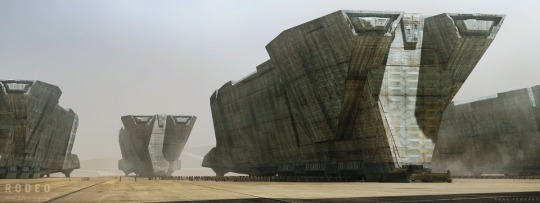

House Harkonnen is their contrast in every way. The book gave their baron a 'suspension rig' to float around because he was so fat, but the movie ingeniously gave that same tech to their troops as well. They float around effortlessly, climbing mountains with a thought, not even engaging with the terrain, perfectly mirroring their attitude and the superior power they represent. They wear black, the categorically worst color for the desert, and their soldier's faces are obscured, almost inhumanly. Their ships are round, bulbous, shaped like rolls of fat, and so darkly-colored and confusingly-shaped that it's hard to even make out their intricate and crowded details except that they're bristling with guns. Their aircraft use lifting gas balloons. Their spice harvesters are so huge and tall and fat with machinery that they need silly legs just to stay upright. Now of course from all this, we can tell that the Harkonnen are so proud that they consider themselves too good for the ground itself, so rich that they don't have to touch it, so powerful they don't think they need to, so disconnected that it's made them weak.
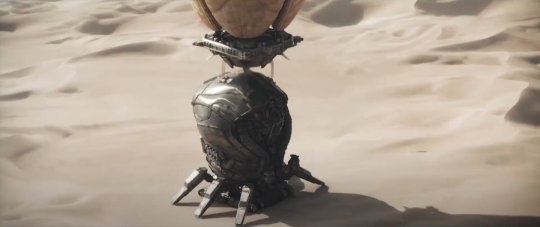
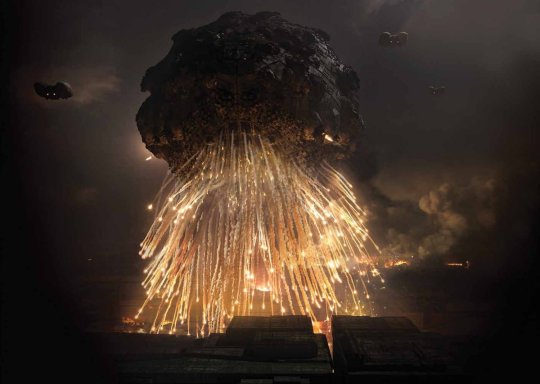
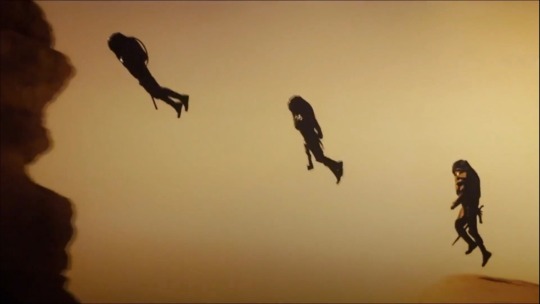
The Fremen are the simplest and most obvious of course; they have nothing. Their technology is simple. We don't see much of it. I wish their thumpers and compasses looked a little more obviously mechanical, but I can forgive that because they look very simple. The only aircraft we see them using are tiny 2-seater ornithopters with only 4 rotors; a copy of nature's dragonfly, no frills. The instruments onboard look like something out of WWII. Just perfect.

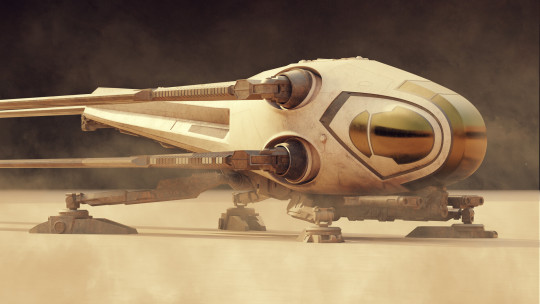

But my favorite of all is the scene where the emperor arrives. The movie shows him going through the flames of reentry, which isn't something movies often show; the director put it in deliberately, because the very fact that he's entering the atmosphere, that he's coming down to the planet at all, is a thing of much importance, spectacle, and monument. And then his ship itself is an enormous shiny chrome sphere. Because of course it is! What symbolism could possibly be better? When you look at him, you can't even see him without just seeing yourself smaller. But as the ship comes in for a landing (and it doesn't even land, it just perpetually hovers) you can see that the mirror isn't perfect. You can see the seams between the mirrors, see it's just square paneling. The emperor is a powerful and proud and magnificent invisible god, except he's NOT, you can see all that splendor and hubris and pride, and see that beneath it all he's just a mortal man, just by looking at his ship. I have never seen that done in quite this way before. Spectacular.


And then and THEN the next time we see the emperor's ship, it's after it's unpacked all its cargo, into this huge palace, complete with a complement of battleships and thousands of ground troops. My first thought was "hey how did all that fit onboard? That should be a literally impossible construction. Oh well, it's just a movie, who cares." But then the Fremen attack happens. A nuclear strike destroys the defenses, and then the sandworms come in, and something hits the palace, and the entire thing shakes and rattles! Because of COURSE it's not an actual building! Of COURSE all that could fit onboard, because it's just a shaky, fragile house-of cards! Sheet metal held together by rivets and a prayer, because he wanted to appear magnificent on his visit! The imperial rule makes a big talk, but it's all bark and no bite and it's fragile enough to be done in by a stiff breeze, and you can tell all that from the mechanical design alone!
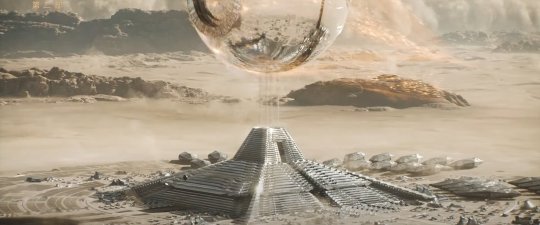
GOSH these movies are good.
8 notes
·
View notes
Text

𝐇𝐞𝐫𝐚𝐥𝐝 𝐨𝐟 𝐃𝐢𝐬𝐭𝐨𝐫𝐭𝐢𝐨𝐧; Conplecte Abyssum. ☽

Name: Volo Age: 27 (as of the end of PLA) Height: 6'3" Date of Birth: Unknown, within the Year of the Garchomp (Dragon) Hometown: Remote village in the borderlands of Johto and Kanto. Current Location: Anywhere, everywhere, whenever, however.
Pokémon (Team): Spiritomb, Roserade, Lucario, Garchomp, Hisuian Arcanine, Celestican Togekiss(Dragon/Fairy). Additional Pokémon: Multiple Togepi, Giratina (when properly channeled)

TRAITS
Positive: Persuasive, action-oriented, resourceful, strong people skills, curious, ambitious, observative. Negative: Impulsive, impatient, self-serving to a fault, manipulative, prone to hubris, penchant for lying.
MBTI: ESTP (The Entrepreneur) Alignment: Chaotic Neutral Sexuality: He has no clue.

BACKGROUND
❛ You see, ever since I was young, whenever I met with something painful or heartbreaking... I couldn't help but wonder why life was so unfair. Why I was cursed to live through such things. Of course, I imagine we all go through something like that. Eventually, I chose to direct all my energy into my own natural curiosity and ambition. And what tickled my curiosity more strongly than anything were the mysteries to be found in legends, in history, in ruins... You see, I fancied that by unraveling these mysteries, I could find out how the world itself came to be–and with that knowledge, maybe even forge a new, better world. ❜
' Before we were gifted names, Before we were men, We were 𝐦𝐨𝐧𝐬𝐭𝐞𝐫𝐬. Before men crowned themselves as the authority of the land, We saw the eyes of the gods posed above the same teeth that were bared by fellow beasts.
To be a 𝐦𝐨𝐧𝐬𝐭𝐞𝐫 was to be closer to 𝐂𝐫𝐞𝐚𝐭𝐨𝐫. '
The story of the world nearly collapsing atop Spear Pillar, begins not in Hisui-- but across the sea, in the land of monsters. Villages crumbled as earthquakes rocked the west. Monarchs were humbled at the capital east of the mountains. Hubris against supernatural forces larger than mortal men was deemed a death sentence. Clans and individuals residing in Kanto's plains and Johto's mountains were beginning to flee and seek refuge elsewhere from the great surge of rampaging beasts, and the natural disasters that resulted from their power.
Volo was only a child when he learned that the old ones still held absolute power over their domain, though it took a willingness to understand their tongue in order to hear their messages.
The reverence of spirits both minor and major was common practice in the time that Volo lived. Every living thing had a soul, and all souls were connected in one way or another. He supposed that was why the collective attitude of his village drew more and more grim as the community struggled with a wave of disease that they simply could not shake off after a particularly dry summer, leading into a bitter winter. He recalled being told by an older villager that the land itself was sick because it was full of anger-- that it was rippling into the monsters and people that called it home. And Volo truly believed this man-- a hardened elder who had lost his arm while defending himself from an aggressive, territorial Tyranitar in belly of Mt. Silver.
Pokémon were, quite frankly, mysterious and dangerous creatures in the eyes of many people. There was very little that the average person understood about these monsters, and those who were brave and skilled enough to tame one, were held in high regard. People paired with Pokémon partners were given the task of protecting the village from larger threats-- be it other Pokémon, other people, or even natural disasters.
This village, cradled in a valley just between Johto and Kanto, was what Volo had called home since he was born. He'd always been there, living an unassuming, but calm life. Both of his parents were appreciated by the village for their agricultural knowledge and skill, growing produce for consumption, and other wonderous fruits such as the apricorn-- the apricorns, highly valued by the traveling Ginkgo Guild, were a favorite of the merchants, who often bought as much of the family's stock as possible whenever it was time for a harvest. This reliable stream of income was appreciated, especially as the village's population seemed to fluctuate.
"Lots of the young ones leave once they reach a certain age. Not a bad thing at all, there's a whole world to explore. Oh, but it does get dangerous-- nobody knows everything that Pokémon are capable of," mentions a calligrapher, sitting up from where he was hunched over his paper, wincing and cracking his back.
"Those Ginkgo Guild folks, they sure do paint traveling around in a positive way."
"Tch, says you, why do you think they're always recruiting? Because they go west, or up north, and slip off of a cliff, or get killed by a vicious beast. If I was losing workers left and right to disasters, I'd be recruiting all day too!" Scoffs a carpenter, wiping the sweat from his brow as the summer sun beats down on him. A Wartortle sways her tail, and cools off her irritated companion.
Volo was only a child when he learned the power of 'want.' The value of working for your wants was instilled in him by his parents, and by the village residents. 'Anything you want can be yours if you work hard enough for it,' was something that he was told very frequently.
"-- I think I'll go out there!" Pipes up Volo, once he turns 11. "I want to see what types of Pokémon and people are outside of this place."
Pensively, his parents agree to it, and wave off their only son as he departs on his first trade route with the guild.
Volo took to the lifestyle very well. He had the opportunity to travel across the lands, searching far and wide with the guild for supplies and goods to sell in villages, and budding settlements. The distribution of a brand new technology, the Poké Ball, was one of the Ginkgo Guild's newest claim to fame, and Volo was able to practice with this tool a great deal on his travels.
Goods and services was not Volo's passion, however. No. He had always been a naturally curious boy, fascinated with the monsters that inhabited this world, and the legends behind them. He dreamt of chance encounters with mythical beasts, and of treasure hunts that ended in fateful meetings with powerful monsters. Since his youngest years, Volo had devoured every last bit of mythos and knowledge that he could get his hands on, whether through storytelling from his mother, grandmother, or travelers in the village-- or from the books that were in his father's possession.
From the western territories of Johto, to the eastern shores of Kanto-- across the channel to Hoenn, the Ginkgo Guild had a large foot print. It was only natural that their trade routes would eventually expand into wilderness of Hisui to the north, where more and more people were choosing to settle for a quieter life. This, naturally, piqued Volo's interest greatly.
"I've never been to the land of Hisui. My grandfather was born there, but, his father took him and the rest of his family away from the region when he was just a boy. I want to go there."
Perhaps-- this would be an opportunity for one of those chance encounters that he had been dreaming of.
Volo was 14 by the time the Ginkgo Guild had finally established a strong enough repertoire with the people living in Jubilife Village, and 15 once he was capable enough to make the long journey to Hisui himself. Though he had been with the guild for some time, staying on a multi-regional trade route was physically and mentally exhausting-- entire seasons would pass without Volo returning to his home, and it was not unusual for the guild to only appear in certain places when seasonally appropriate. Summer was harsh in Kanto, and winter was unforgiving in Hisui. They needed to be certain to always return to Johto for the apricorn harvest as well.
But, there did come the day that Volo had the opportunity to wander Hisui himself-- of course, when he was not tending to his duties.
He was quickly warned of the dangers that were present in this region: Pokémon that were far more powerful than anything he had ever encountered occupied every last corner of Hisui. The land itself was rugged too, and difficult to navigate solo. He was informed of the survey work performed by the Galaxy Team and the respected Professor Laventon, along with the established authority of the Diamond and Pearl Clans.
But, what drew him in the most, was the whispers of a witch of sorts, who lived in a secluded space in the northeast.
"I want to meet her. She should be able to tell me anything I could possibly want to know about this land!"
It took some convincing (and, perhaps, a lot of wares sold at a tremendous discount), but Volo would eventually be told where to find the witch called Cogita at the Ancient Retreat. This journey would had to be made alone though, for nobody wished to bother the powerful woman themselves; Cogita prefer to keep to herself, toiling away at her work, and minding her own.
After an incredibly arduous journey, Volo would be overjoyed to find the fabled retreat--
And Cogita would be shocked to see the face of what she could only describe as a ghost from the past.
Once a painfully shocking and awkward exchange is had between the two of them-- Volo, who was far too enthusiastic for his own good, and Cogita, who was prepared to knock this intruder out cold-- a proper conversation begins.
Cogita remembered when the last of her remaining family had made the decision to leave the retreat, and the entirety of Hisui. It came to no surprise for her: as the years passed, the younger generations wished to know what was outside of this seclusive land-- there was more to this world than Hisui, her wilderness, and her crumbling ruins. But Cogita had to remain, for reasons that she had kept close to her chest for many, many years.
Cogita's son had been the one to make the decision to leave with his wife, his sister, and her only grandchild. This boy, Volo, who appeared nearly a century after that had happened, wore the same face as Cogita's late husband.
Naturally, when she explains this to her guest, he is struck with disbelief.
"But my grandfather left Hisui when he was still a child. Your story doesn't make any sense, that would make you easily, that would make you-- HUNDREDS of years old."
Cogita could only narrow her eyes and frown. The boy really knew nothing of where he came from, what he came from, nor who he and his family were.
"Time is a manipulatable construct," is all Cogita would say to that. There wasn't a need to go into great depths about her apparently lack of aging.
"Did you only come here to bother me? Or did you have actual questions to ask? Tell me what it is you want."
And with that wondrous expression, Volo says:
"I want to know everything."
There is a pause as the old witch stares upon the boy, and then smiles with crinkles in the corners of her eyes.
"Very well."
The Celestica people once inhabited this land of Hisui. Considered to be blessed and veiled by The Great Unknowable and all of Creation, their people flourished on this land, communing with the gods, and connecting with the Pokémon that lived on the land as well. A wildly curious society, they studied anything and everything: sciences, art, transportation, language, and many concepts that would be considered arcane and esoteric by the modern man. The Celesticans had a rich, vibrant culture, owed to their deep connection with Pokémon, and the spirits that they allied alongside with. Their civilization fell, though-- and it is uncertain what exactly brought the Celestica to their knees. The full story has been lost to time, but several preserved verses from their written history suggest multiple tragedies that led to their disappearance: some allude to war thanks to the greed of a ruthless emperor, others, to plague. One tells of the sun being swallowed, the light no longer gracing the land. A darkness fell upon Celestica, fear filled the hearts of every man, woman and child. Some fled. Many more died. And then, one day-- the Celestica were no more, and this was a land only occupied by Pokémon.
"That still doesn't explain why you've lived this long," Volo would furrow his brows in confusion.
And Cogita sighs, chin resting in her palm, spoon stirring a cup of tea sat in front of her.
"I've been Chosen, you see, to assist someone on a mission delivered from above. Who knows how long I will be kept alive by the old ones? Another 1000 years, or however long it takes for this fabled person to arrive on their mission. Who that someone is. . ."
Another pause.
"I am not certain yet."
Could he be that someone--?
It would not take much further persuasion for Volo to get Cogita to take him as an apprentice in arcane practices, knowledge of the Celestican roots, and the art of wielding Pokémon. For the next decade, he would choose to remain in Hisui, calling it his home.
During the day, he would fulfill his duties to the Ginkgo Guild, assisting them creating a permanent establishment in Hisui and a great relationship with the settlers of Jubilife Village. Even the Diamond and Pearl clans would begin to conduce business with the trading guild.
At night, and while he was not saddled with responsibilities, Volo dedicated his time and energy to absorbing everything he could about the legends and teachings that Cogita offered him. He was diving into fantastical work, and into a world where the might held by Pokémon was not far removed from humans as well. He participated in rituals that had long been forgotten by most, and communed with entities that he came to know as the old kamuy. With every hidden secret that Volo learned, he grew more and more capable, and Cogita truly thought that this was the young individual that she had divined as the one with "the mission from The Almighty Unknowable."
Volo would still find time to occasional return to Kanjoh to visit his parents and extended family, though he chose not to share with them what he knew about Cogita, and the remarkable journey that he had embarked on. After all, had it not been his past lineage that chose to leave their connection to Hisui behind? Why should he reveal the secrets that HE had worked hard to obtain-- to those so far separated from it? It simply did not concern them, in Volo's eyes, and he truly believed that sharing this information would be more than either of them could handle. They were content in their life, and there was no reason to disturb that.
Over some time though, Volo's hunger for knowledge was drawing him towards darker, more deranged information. He became completely obsessed with the mythos of The Mighty Unknowable, and The Void: Arceus and Giratina. After everything that he had come to understand, the countless secrets, the fantastic knowledge, Volo would not be satisfied until he learned everything, and SAW everything.
Cogita cautioned Volo against attempting to dive into the depths of Giratina's knowledge, and strictly forbade him from make any effort to contact the vast abyssal deity.
"There is nothing that The Great Old One has to share with us, it's best not to antagonize it. Your best option is to continue your work with searching for the old plates of Sinnoh."
. . .
"But I want to know it and Arceus."
Driven by an obsessive need to meet these eldritch forces, Volo began to neglect his duties with the Ginkgo Guild. Without realizing the passage of time, he also failed to return home to see his family for many, many years. Every thought he had, every breath he took, was a part of his deranged focus of communing with these Old Ones.
And he WOULD eventually commune with the old king of distortion, deep in the depths of Turnback Cave-- from there, Volo found himself on a path that he no longer had full control of. By creating a pact with Giratina and being chosen as its herald, Volo surrendered his human life, and was removed from the mortal coil entirely; existing in an in-between state beyond time and space, he accepted a pseudo-immortal reality, where he was simply not effected by the passage of time and space. In exchange for the eldritch truth, Volo agreed to be a vessel of the void, to be used when need be.
Yet, he was not satisfied. Truthfully, if he could create a strong enough bond with the mighty Giratina, the one who had been sealed away by its creator, then perhaps he AND the king of distortion could draw Arceus out of hiding, and finally, Volo could have the satisfaction of seeing and understand EVERYTHING at his fingertips.
At least-- that was his motivation initially. All he wanted to do was see. And understand. And know. It wasn't until Volo's consistent exposure to Giratina's madness, and the eldritch truth that was instilled into him, that Volo saw visions of calamity in the future and harrowing omens from the past. He began to see himself as something greater than the average man, experiencing a delusion of divinity, that HE ALONE could alter time and space itself, and that HE ALONE could not only commune with Giratina as its liege, but also convince Arceus, The Mighty Unknowable, to heed his word.
"I saw something, I was plagued with the most disturbing vision, a world where all life has been wiped out, no people, Pokémon or monsters could set foot in this world without being wiped away completely. I saw the gaping mouth of extinction, its hands stretched out to smother. It cannot be stopped. And it will not stop in just THIS world, it will do the same elsewhere. There is no solution to preventing this reality-- the only choice is to disobey the creator, and erase this universe destined for destruction. A new one can be born from this divine obliteration. A world where the demiurge does not allow that evil miasma to destroy us, and the next universe, and the next, and the next."
Volo's meddling with the fabric of reality, as if it were nothing but a clothe for him to cut and mend at will, resulting in the space-time distortions across Hisui, and the massive rift tearing the sky over Mt. Coronet open. With the help of power granted to him by Giratina, he hoped that the disturbance would bring Arceus down from his heavenly pedestal, going so far as to bring people from other points in time to Hisui, and stirring up the Noble Pokémon into frenzied states.
Yet, there was no sign of the Creator.
The story would go on as a strange child would be the next to fall from the rift in the sky, with only one statement left in their mind before they woke up in the Hisuian Wilderness: Seek out all Pokémon.
The tale of the young hero who would quell the frenzied Nobles, compile the first complete index of Pokémon, prevent certain destruction of Hisui by creating the Red Chain and meeting the legendary "Sinnoh," and eventually reaching the summit of Mt. Coronet, is remembered by many. Though most do not know of Volo's continued mental decline as he feverishly realized that he was not the 'one with the mission' that Cogita had thought he had been-- it was this mere child. His purpose began to collapse, his identity falling apart all around him. But his divine delusion remained true. HE had to be the one to commune with Arceus, HE was the one who connected with Giratina and became his herald, HE was the one burdened with the eldritch truth and the visions of the past and future. There was no way that this outsider could take the helm of this job!
What he could do, was continue to mask as a simple helper on this hero's journey, and manipulate them into collecting artifacts and objects that he needed in a last ditch attempt to draw down the creator. Sabotaging his connection with Cogita, who was already highly suspicious and critical about her descendant's behavior, Volo spiraled.
"My desire to meet Arceus cannot be contained any longer! I need to know what it is! I MUST know what it is! If I can meet Arceus myself, then I may also be able to subjugate its power. . . And using that, I will attempt to create a new, better world! Of course, if I create a brand-new world, then the Hisui region that we currently exist in will be undone and returned to nothing. You, everyone you know, and all the Pokémon living here will vanish in an instant, as if you'd never been."
How harshly Volo would be humbled, as he was struck down atop Mt. Coronet, when Giratina itself turned its back on its herald's deranged mission. Ripped from the sky and cast aside, there were no other options that Volo could use to claim victory. His false mission was over. He was not Arceus' chosen-- the man that had become obsessed with the sun, was destined for the void.
And while he accepted that this was the end of his mad journey, Volo still had ambitions to meet Arceus.
' Someday, I'll solve every riddle in the legends of Hisui's Pokémon. And on that day, I'll stand before Arceus at last—No, I will CONQUER it! No matter how many years, how many decades, how many centuries it takes me! '
. . .
What has become of Volo since his loss atop Mt. Coronet? The man still wanders the earth, coming and going from varying points in time. Some believe that he manipulates events in history out of pure curiosity. As the continued herald of Giratina, Volo comes and goes from the Distortion Realm. When he occasionally allows Giratina to use his body as an avatar, Volo falls into statis afterwards, and slumbers in the Great Old One's plane until his body recovers, sometimes for years at a time. Therefor, Volo has disappeared from history, only to emerge at the most bizarre times.
And while it took a great deal of time, Volo has come to terms that his role as the Herald of Giratina is enough of a crown for him to wear, despite it not being the destiny that satisfied him initially. Giratina's pact had elevated him to what some would even consider to be a demi-god. Though, Volo still acts very much the same way he did as a simple human.
There is still a deeply seeded ambition to prevent the calamity that he saw in his vision all of those centuries ago. And it is his belief that if he were to take up an apprentice in his lineage in the same way that Cogita had done to him in the time of Hisui, that his successor could be victorious.
It should come to no surprise then, that one of the most fearsome and respected trainers in modern history is a woman with a fascination for mythos and legendary Pokémon-- and is the current seated champion of the Sinnoh league. Her resemblance to her ancestor is quite uncanny, it is as if the two have already known each other.
Perhaps they have.
But one thing is for certain: Volo's influence is still alive, and until Giratina itself is no more, there is no ridding the world of the man who had once loved the sun. The eldritch truth must be bestowed upon another so that Volo's vision was not gifted to him for nothing.
#𓇻 ˚ « 𝐍𝐚𝐭𝐮𝐫𝐚𝐥𝐛𝐨𝐫𝐧 𝐨𝐟 𝐭𝐡𝐞 𝐕𝐨𝐢𝐝 » Headcanon#{ IT IS FINISHED. }#{ Some details are kept vague because they will be explored in roleplay interactions and in other headcanon posts. }
11 notes
·
View notes
Text
I'm still thinking about the encounter from last night.
If there's an Aqua revival group running around, it's safe to say there's a Magma revival group as well. This is. Already not good. Hoenn has been subject to enough climatological disasters. It's a wonder the ecosystem hasn't collapsed entirely. I suppose we are simply resilient.
But. Regardless. Defiance of the natural order in such magnitude cannot persist.
I have faith that, if worst comes to worst, the Guardian will right the wrongs of man as he always has. He knows our hubris. He knows we, the grounded creatures we are, crave the power to alter the skies, the seas. We warp all aspects of our natural world to our desires. We wish to hold even a piece of the Three Ancients in our veins—and in some ways we have that piece. The scientist we met on that route was researching the primordial links between modern pokemon and their ancestors. Perhaps we share a link to the ancients in much the same way. But we always stretch our hands too far into the scales. A distant connection does not give us the right to such power.
They will either stop walking this desolate path, or be brought to their knees, humbled and forced to accept the vanity of their actions in the face of the Guardian, humbled as Archie and Maxie were before them.
I have faith in thee. No man or beast will disrupt our balance. Our unity. I hold this as truth, O'Guardian.
8 notes
·
View notes
Text
G/t July #23: Weapon
A rustling in the bushes drew Landon's attention. He loved to observe nature while he walked in the park behind his neighborhood. Usually the animals just ran away. So he froze and waited, hoping whatever was scurrying around wasn't too spooked to come out and show itself.
That's when he noticed that it wasn't just the bushes in front of him - he heard suspicious rumbling from all sides. There was also a scraping sound that reminded him of running a knife over a whetstone, followed by hushed voices.
"Who's there?" Landon called out.
A sudden high-pitched bellow from behind started him. "Trespasser! Interloper! Bumbleruffins, attack!"
All around him he saw people emerging from the bushes and rushing him. Well, not really people. They were only a few inches tall, for one. Though they wore clothes and walked upright like humans, they looked furry like mice. None of that was quite as important as the fact that they were all brandishing weapons. Tiny weapons like toothpicks and pebbles, but weapons all the same. Landon wasn't sure how they planned to actually hurt him with those but he didn't intend on finding out.
He held out his arms as if to command them to stop. Funnily enough, they did, stopping in a ring surrounding him.
"Are you prepared to die, felon?" one of the creatures said. He couldn't tell which.
"Who said that?" Landon asked. "And what are you?"
One of the creatures stepped forward to stand at his feet. "I am Rimsleydale, king of the Bumbleruffins."
Landon stifled a laugh. "Who?"
"BUMBLERUFFINS!" the little man bellowed, his voice surprisingly resonant for someone of his miniscule stature. "And I am their king: the noble, wise, handsome, winsome, and exceedingly humble Rimsleydale. First of his name. And don't you forget it! Anyway, where was I?"
"We're going to kill the giant," said another of the Bumbleruffins.
There were murmurs of agreement among the throng. "Yes, kill the giant. He'll be so dead. He won't even know what killed him."
"Woah, woah," Landon protested. "You're going to kill me? Why?"
"The giant dares ask why," said Rimsleydale with derision. "You have trespassed on our lands for too long. You must pay the price!"
Landon rolled his eyes. "And how do you think you're going to do that?"
"Axurelia!" cried the little king. "Bring out the Divine Sword of Lothferien!"
There wasn't even time for Landon to ask what on earth they were talking about before he saw a handful of the Bumbleruffins dragging out a sword from the bushes. And it was a sword - a real one. Meant for human hands. They carried it like they were holding a litter, two on each side at intervals along the hilt, pommel, and blade. There should have been some kind of fanfare for such a slow procession, but in the ordinary stillness of the park it just felt awkward.
"Who is the sword for?" Landon asked, certain of the answer and preparing for the ridiculousness of it.
"And now…" Rimsleydale announced, both for Landon and for the crowd of his admirers. "And now, to slay the colossal beast with the holy sword! Bumbleruffins, assume the position!"
As one they all took a knee, except for the ones holding the sword. "Uh, how do you expect to attack me with that?" said Landon. "You're way too small."
Rimsleydale laughed uproariously. "Ha! Such an arrogant beast! Such hubris! Have you ever considered maybe you're too big? You think you can do whatever you want. You trespass on our lands. You cut down our trees. You take our women - "
"What? I don't want your women. What are you talking about - "
"SILENCE! You dare to speak over the king of the Bumbleruffins? Well, you may be big, but the bigger they are, the harder they fall. Now, my soldiers, charge!"
Those Bumbleruffins which were carrying the sword lowered their heads and made way straight for Landon. Well, straight for Landon's ankle. And very slowly. He could only stare in disbelief for the full minute and a half it took for them to reach him. All the while the other Bumbleruffins remained in reverent silence.
"Ow," said Landon as the sword finally reached his ankle. It felt like being poked with a needle, if that needle were too dull to pierce the skin. And also were moving at one inch per hour.
"How do you like that, beast?" cried Rimsleydale triumphantly.
Landon checked his leg for any sign of bleeding, but of course there was nothing. "I'm fine," he said. "Was that… it?"
The Bumbleruffins looked to each other in confusion and fear. "My people, there is only one thing left to do," Rimsleydale said. "Retreat!"
As one the Bumbleruffins began to scatter. "Run away, run away!" they screamed. "Everyone to your homes! The sword of Lothferien has failed! Stay in your homes! Only the gods can protect you now!" Those who were carrying the sword dropped it as they ran.
Just as suddenly as they had first appeared, they were gone. Landon looked around to see if anyone had noticed this strange event, but no one else was even around. If this was some kind of Candid Camera gag, he couldn't see how.
"Oh well," he told himself, bending down to inspect the Divine Sword of Lothferien. It looked perfectly ordinary. He picked it up and felt its heft in his arm.
Landon smiled. "Cool sword," he said.
10 notes
·
View notes
Text
Make of me a garden
I stagger along blindly, arms held ahead as a futile shield against the biting wind and blinding snow. The winter is harsh and long, and there is no salvation to be found amongst the frigid dunes and pallid streets. Around me stretches a city, once proud, now humbled by the fury of nature and folly of man. A ruin wrought by hubris and willing ignorance. There are still remnants, those unlucky few who, like me, scurry through wrecked streets scavenging for scraps, fighting through the rubble as our forefathers did, and so too theirs; tattered banners held aloft as if they still hold meaning, bitter men acting out of stubborn spite to make sure that if they cannot win, then nor shall anyone else. It doesn't matter now. Winter is here, and its armies cannot be defeated. We shall die to lances of ice and blades of hunger. I stumble and fall, my legs finally failing, collapsing under me, leaving me curled up in the snow. I try to move, to rally some last gasp of defiance. Some will to live despite the odds. Nothing comes. I will die here, I realise, dimly. I should probably feel upset. Perhaps resigned. Angry, even. Instead I just feel numb. And cold. Above me the wind howls its ferocious battlecries as it scours the streets of life. I move, pulling myself to a wall, propping myself up against it, until my arms too fail, leaving me stranded. A puppet with strings cut. It occurs that I don't feel cold anymore. Hope blossoms faintly, far off and growing farther. Maybe I'll live. I'm warming up, not even shivering. I just need to stand up and get moving again. I try but somehow my body doesn't respond. I'm even warmer now. Hot even. Too hot. It's like I'm on fire. And then that too fades.
My breathing is the first thing to go. Lungs frozen. Then my heart stops, starved to death. My consciousness fades, my last thoughts a confused mess of memory and delirium.
I die.
The sun sets, rises, sets again. The storm passes. The sun rises in a clear sky. A raven comes to land upon my knee, head cocked as it examines my frozen carcass. Curiously it hops forward, head twisted to the side, black eye meeting my blank gaze. It turns to me again and pecks my cheek, quickly drawing back as if expecting me to wake. I do not. Apparently satisfied, it hops closer again, still cautious. Its head draws back and then its beak plunges into my eyeball, gripping hard as it pulls. Once, twice, thrice, and the eye tears free in a sudden jolt of movement. It stumbles slightly before regaining its footing. Bending its head backwards, the raven gulps the eye down greedily, blood shining against its matte beak. It swallows, hops onto my shoulder, and then takes my other eye, cawing happily after it swallows it down. Apparently sated, the raven takes flight. Night falls, and with it more snow. I am covered, naught but another corpse in this sepulchral ruin. Time moves on. The snow thaws, falls, thaws once more. Night and day have no meaning anymore. The raven returns. It takes my tongue, happily tearing away until it is fulfilled, then flapping up to the building above me to croon away the hours. Time passes. The snow falls less often. It rains. I thaw and begin to rot. The raven enjoys my frostbitten fingers when they grow soft enough to eat. A dog is drawn by the stench of decay. It tears into my midriff, revealing the sumptuous guts within. The dog and the raven eat together: I am plentiful, so there is no need for conflict. The dog sleeps beside me, the raven perched above. Days pass. A frost comes, unusually late. The raven shelters within my carcass, protected from the cold. The dog has lived through worse. The cold passes. Time moves on. The dog leaves, my body now stripped almost bare. The raven remains, pecking at the flesh which still clings to my bones. There is a crack in the tarmac in front of me, from which a small green shoot emerges. The shoot grows. The raven makes a nest in my ribcage. Time passes. Another raven arrives. A mouse chews its way into my skull. The ravens hatch chicks. The mouse builds a nest. The shoot grows. Time passes. The ravens leave the nest. Winter comes. Winter goes. The mouse finds a mate. The ravens have more chicks. The shoot grows into a sapling. The dog returns. The mice leave. The dog has pups. The sapling grows, cracking the tarmac. The pups leave. The dog dies. The ravens eat the dog. The sapling becomes a tree. Leaves fall and rot and become dirt. The dirt grows grass. The grass dies and becomes dirt. I am smothered, my bones scattered and buried. Flowers grow atop me, their roots wrapping about my bones as once I trailed my fingers through their heads. Ivy wreaths the wall above me, grass carpeting what once was road. A tall tree stretches over me: its branches spread wide, its verdant leaves casting a patchwork quilt of dappled shadow, spots of golden sunlight warming my yellowed bones. A raven perches atop my skull, pecking at it fondly, its feathers gleam under the warm sun, ruffled slightly by a balmy summer's breeze as the leaves above susurrate and rustle. I feel the loam around me, so full of life. I hear the grass growing, the insects working tirelessly, a happy caw from the tree branches. I see a black silhouette circling lazily on high.
I am a garden.
I grow.
I rest.
1 note
·
View note
Text
Nov 18 Stream Timestamps
Timestamps from Technoblade’s “the fallout (dream SMP)”

Link to my youtube comment with all of the timestamps x
Timestamps with hyperlinks below
01:30 Techno realizes something / “The universe does not like me”
04:41 “That’s how problems work, you just ignore them” / wanted to name the stream the aftermath but he already did that
05:29 “Ever since the revolution the people of this server have decided my base is public property” / his biggest pet peeve / gets so mad at the twitch chat encouraging them / “We’re fugitives. The government will not accept my existence”
08:16 “I’m not furious right now” / won’t know what’s missing till he needs it
09:48 “Do you like girls?” / couldn’t think of anything funny so he didn’t respond
11:44 “I wonder if Dream disable =d the weather cycle because he was mad at people flying with riptide” / cows are gone / zombies are annoying
13:40 sad cow roleplay / “Stop spamming me to vc I’m trying to monologue”
16:26 vc with Phil / “Phil shut up...I’m doing content” / “Please Phil just let him live” / “I watched Fundy do it on stream but I can’t say that because it would be breaking the 4th wall”
19:46 “I was trying to be a cool loner oppressed by the world and you being here...is kinda harshing my mellow”
21:45 realized at the beginning of the stream that he had an appointment / looking for a new base at a moderate distance
26:14 “I’ve achieved peak livestreamer” / “There’s no way that’s pronounced Khorne”
28:09 “Tommy called you a furry in disguise” “Well I can hardly kill Tommy at a rate higher than I already am” / Puffy trying to tell Techno about Carl / gonna copy a build for his new base
31:44 vc with Puffy / “I have a gift for you” “Is it clout?” / “You can just mail those to me”
33:17 “I’m not moving. I’m in the same place I always am” / killed Puffy mid robbery / tuxedo rental shop / dolphin jumped onto Techno’s boat
37:53 dono’s friend is a Tommy simp / “You need new friends. It’s one thing to be a Tommy viewer”
41:41 vc with Schlatt, Conner, Tommy and Puffy / saying canonically a lot / escaping with Carl
45:22 “I would send you my energy, but it is incredibly weak. Take my money instead” / blood for the blood god trended cause of the 100k duel / he has a cousin into warhammer / clearing out base
53:18 anarchistic activities / “Use creative mode” “Why didn’t I think of that one?”
56:54 people getting mad at Techno calling Theseus a hero / “I don’t care that he was a douchebag, he was still a Greek hero” / Theseus and Tommy parallels / “Theseus’ whole plotline is just ditched a woman, feeling good”
1:00:29 Perseus / reading a wikipedia page and pretending he already knew it all / “Oh Zeus!...He’s the guy from Percy Jackson!” “I will punch you in the face”
1:03:31 “Fun fact: Technoblade is 25% Greek” / “I could be a Greek semi-demi-god”
1:06:53 perfect naturally generated snow trap / “Imagine Dream was 50 minutes in to the most epic manhunt of his life and then...he falls into some dumb snow trap” / making a 51st crafting table
1:09:16 Perseus summary / “Andromeda’s the god of speedbridging right?” / English teacher who talked more about Diana Ross than english
1:11:51 “Would Oedipus be considered a Greek hero” / “You do not need to tell me about what Oedipus did I already know” / “I was an English major...and took psychology classes”
1:13:25 “I don’t suffer from hubris because hubris is a flaw and I am perfect”
1:20:43 demi-god fractions / “They probably thought he was 150% Zeus” / best type of fan can’t watch but donates anyway / “Percy Jackson is great and all but the fact that it’s the only reason that people know Greak mythology...ruins me”
1:25:47 “Wanna hear about Jason?” / “Medea...chopped her brother into a million tiny pieces and cast them into the ocean” / Jason decided to cheat on her
1:29:04 pronouncing “gist” wrong / English majors can’t pronounce him / “Cannot imagine why they banned fireworks”
1:35:54 Techno telling us about his fav guy from Greek myths / left him and the magic bow behind bc his foot smelled
1:50:00 “Dream has 12 million subscribers, I only have a humble 3 million”
1:56:01 “You want me to do two things??” / “I kinda like Bernie honestly”
1:57:51 “You’re telling me there’s people going around dating people because they know me but not dating me??”
2:02:09 “Techno would you like to go on a date with me” “Uh no. It’s quarantine you have to understand”
2:05:18 debately canonical / achilles
2:09:13 “Techno I would love to quarantine date you” “Alright thank you for the donation” / “Why would you bully the government man, they’re just the government” / insulting animes is a bad career move
8 notes
·
View notes
Photo
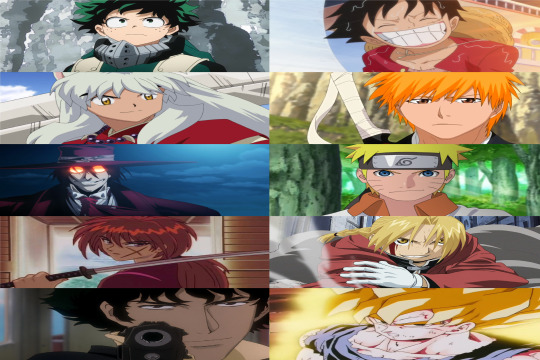
My Top 10 Favorite Anime Heroes (Updated) by DarkChild316
“Guess who’s back…back again! DarkChild’s back, with 10 more friends!” LOL, sorry for that lame-ass joke, but I was listening to some Eminem earlier today. Anyway, my terrible sense of humor aside, I thought it would be a good time to give my list of “My 10 Favorite Anime Heroes” an update, figured since I did one for the villains I thought shit, might as well do one for the heroes too! Now once again, this list is strictly for the men only, if you want a list of my favorite anime queens, check out my list of “My Top 10 Favorite Anime Heroines”. But in the meantime, enjoy this updated list of my favorite anime heroes:
#10. Izuku Midoriya (My Hero Academia): One of the newest (and quite literally) entries on my list, Deku is a character who dreamed of becoming a hero in spite of being born without a Quirk or any kind of powers in a world dominated by heroes with them. Only to be chosen as successor to the greatest hero of the age, All Might. A humble yet caring fanboy at heart, if All Might represents the Golden Age of heroes, then Deku represents the future of heroes in the Modern Era. He may be a socially awkward cinnamon roll at the best of times, but don’t let that fool you into thinking that he’s not willing to stand up and do what’s right when the chips are down and the world needs a hero to stand for, no matter what form of villain is in the way! The only reason he doesn’t rank any higher on this list, is because he’s still relatively new to the scene and time will tell where he stands in the Patheon of anime legends.
#9. Inuyasha (InuYasha): He’s half dog-demon, half human: put it all together and what do you get? A sword-wielding hybrid who knows how to take care of business. Originally wanting nothing more than to become a full demon, his human heart trumped his selfish desires, leading him to fall for the modern-day schoolgirl he vowed to protect. Fighting through feudal Japan to recover fragments of the Sacred Jewel, InuYasha can be both cold and rude, yet heartfelt and compassionate. Plus, he makes us all laugh whenever we see this happen.
#8. Alucard (Hellsing): There have been a shitload of vampires in modern anime, yet all of them owe their debt to this tall, dark, well-dressed man. There has never been a vampire as delightfully sadistic as Alucard but unlike most vampires, there’s a method to his sadism that makes him truly brilliant. He isn’t truly evil, he’s just a monster who revels in destroying other monsters in any sadistic way he sees fit. And he truly revels in it, making his victims (most of which are evil Nazis and powerful demons) believe they actually have a chance by damaging them before regenerating and wrecking them in devastating fashion. This isn’t to say he’s totally heartless though, as he’s shown a great deal of fondness for the members of his team who are just as devoted to ridding the world of the evil forces that threaten it. Even though the anime version of Alucard mentions that he doesn't entirely understand humans anymore, he seems happy to work in the service of them, and to protect them from devils who aren't as honorable as he is.
#7. Kenshin Himura (Rurouni Kenshin): When I was a kid, Rurouni Kenshin was my favorite anime growing up and Kenshin was my favorite character. Having had a chance to revisit this anime recently during lockdown reminded me once again why that is, Kenshin is easily the most compelling character I had seen growing up as a kid and he was a refreshing change of pace in the samurai genre. Firstly, he was quite feminine to the point that many mistook him for a woman. He was also one of the politest characters in anime history, frequently putting others before himself and speaking to them with the utmost respect and patience. If you didn’t know any better, you’d think the guy would be better suited as a florist that a samurai. But underneath that smiling exterior hides a dark secret, Kenshin is a man haunted by the demons of his past. A former mercenary who killed countless foes, he makes a vow to never kill again, and is repeatedly tested on that vow time and time again as less virtuous people endanger the country’s peace. When Kenshin's hand is forced, he can go to incredibly dark places and fall back into the habits that made him known far and wide as the most fearsome swordsman in the land. Although Kenshin’s momentary lapses make him a complete badass and set the stage for some of the most epic sword battles ever animated, Kenshin always goes back to his sweet persona once the danger is gone. But in his solitary, quiet moments, he's gripped by his greatest fear; that one day he will permanently revert to his former self and become a manslayer once more.
#6. Spike Spiegel (Cowboy Bebop): I’ll admit, it had been a long time since I’d seen Cowboy Bebop, so naturally I had forgotten about how cool a character Spike Spiegel was. Thankfully, this pandemic has allowed me to revisit it, and I find myself being just as in awe of Spike as I was when I was kid in the 90’s, he’s that awesome a character folks! Spike was an amalgamation of influences (from Bruce Lee, to Lupin III, and a little dose of film noir), and the result was a creation greater than the sum of its parts. In a series like Cowboy Bebop, which was itself a combination of cultural influences from around the globe, Spike was the essence of the story. Voice actor Steve Blum launched his career into new heights when he gave the performance of a lifetime in the English dub of the series, giving Spike a sense of smooth, effortless cool that many argue surpassed the original Japanese version.
Spike proved to be a versatile character; he was an expert pickpocket, a gearhead who worked on his own spaceship, a clever detective, a badass fighter, and even a bit of a philosopher. But what made Spike most interesting was his past as a gangster, and a man hopelessly in love. His relationship with Julia, and the tragic end of that relationship, haunts him throughout the series and shows us what truly mattered to him all along. When Cowboy Bebop reaches its powerful conclusion, Spike goes out in a blaze of glory that is unmatched in the history of anime (all I have to say is “Bang”).
#5. Ichigo Kurosaki (Bleach): The first of the shonen “Big 3” to appear on my list, you’d think being born with the ability to see ghosts would be enough, but not for this high-school bruiser. After a fateful encounter with a Shinigami, Ichigo gains the power of a god of death, and is tasked with defending his home from the malicious spirits known as Hollows. As his seemingly endless battle stretches to other planes of existence and some truly frightening enemies, both Quincy and Hollow, this orange-haired swordsman will keep fighting to protect what matters most to him no matter what.
#4. Monkey D. Luffy (One Piece): The second member of the shonen “Big 3” to make my list, this straw-hatted rubber-man takes my vote for his carefree spirit and his big heart. With the dream of grabbing the title of Pirate King, Luffy is a man who thinks with his stomach and fists rather than his head. Always in the pursuit of adventure, this happy-go-lucky guy may be the last person you consider when you think pirate captain. But you’d be wrong: You mess with Luffy’s crew and he’ll declare war on the entire world to save them.
#3. Naruto Uzumaki (Naruto): Talk about a rough childhood. After having a powerful demon sealed inside of him, Naruto was a social outcast in the shinobi village he grew up in; even though people despised him for being the vessel for the Nine-Tailed Fox demon he did not take the darker path in life nor did it deter him from pursing his dream of becoming the village leader to gain the respect and admiration of those who once shunned him. Naruto’s growth as both a ninja and human can be seen throughout the series, as it was this good nature of his and the will to protect everyone close to him that slowly changed the attitude of people towards him as the bonds of friendship he forges make his dream worth fighting for.
#2. Edward Elric (Fullmetal Alchemist): Wildly ambitious, wickedly smart, and wise beyond his years, Edward Elric entered the stage with a fresh, but interesting take on the modern shonen anime hero. Unlike those who came before him, he wasn’t this lovable idiot with a heart of gold. He was smart, calculating, arrogant, and shrimp sized. But most daring of all was the fact that Edward is technically handicapped, having had both an arm and a leg lost in a tragic accident fueled by love and hubris. In Edward we had a character who unlike most anime heroes was truly multidimensional. He could be comedic and pull off wild takes and sight gags. He could be placed in the most tragic circumstances and portray the deepest kind of sadness. He could be a complete badass, but he could also be the nicest guy on the planet. And most of all we saw Edward discover harsh truths about the world and learn that he didn’t know nearly as much as he thought he did.
#1. Son Goku (Dragon Ball): With the greatest respect to those like Luffy and Naruto, none of those characters would have ever been possible without this man (and the creators of One Piece and Naruto have even admitted this themselves). The prototype for shounen lead characters, Goku was somewhat of an anomaly back in his day. When the plucky, pint-sized kid Goku first appeared in Dragon Ball, the trend for male heroes was to have larger than life muscle heads (which Goku ironically turned into in his adulthood). Goku also grew up; another drastic change in a time when characters rarely changed much. But Dragon Ball Z is where Goku truly earned his fame. Goku isn’t even the most popular character in DBZ sometimes, but he is the foundation of the series. His heroism, strength, and dedication make him the perfect core for a kid’s show where the themes are meant to be pretty simple. He may not be the most complex character in anime history, but he’s perfect for the goal he was meant to accomplish. But Goku isn’t my top hero so much for his character complexity; it’s his influence that cannot be denied. He was, in many ways, a character that bucked the trends of his time and defined the direction of shonen manga/anime for decades, and that's why he's my #1 anime hero of all-time.
So that's my list, what did you guys think about it? Love it, hated it? Go on and tell me what you think and let me know who your favorite anime heroes are. See you soon!
Deviantart: https://www.deviantart.com/darkchild316
#izuku midoriya#my hero academia#inuyasha#Alucard#hellsing#kenshin himura#Rurouni Kenshin#spike spiegel#cowboy bebop#ichigo kurosaki#Bleach#monkey d. luffy#one piece#Naruto Uzumaki#naruto#edward elric#Fullmetal Alchemist#goku#dragon ball
19 notes
·
View notes
Text
Viren and Callum—Defining Heroism
Callum is a foil for each of the three antagonists, and each season focuses on a different pairing.
During Season 2, Callum’s arc was a foil to Claudia’s. I break down some of the similarities between them here. Callum and Claudia both exhibit a curiosity to learn more about magic (particularly at the Moon Nexus), and both are fiercely protective of those closest to them. To the extent they will use Dark Magic to protect them.
But whereas Callum tries it once and decides to reject it for good, Claudia continues to succumb to this temptation, time and time again.

During Season 3, Callum’s development is contrasted with Aaravos. At this point, Callum is, like Aaravos, a magical prodigy; each had mastered at least one Primal Source they weren’t born connected to.
Additionally, both demonstrate great influence over the lives of those around them. But they are diametrically opposed in terms of their goals. Whereas Aaravos cares primarily about advancing his own interests, Callum wants to genuinely help people, and empower them to make their own choices (as opposed to manipulating them like Aaravos).
This foil can be summed up simply—Callum is motivated by the Narrative of Love. Aaravos is motivated by the Narrative of Fear.
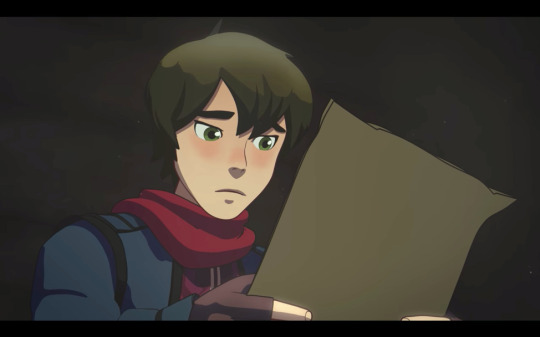
Harrow: “I ask you and your brother to reject history as a narrative of strength and instead have faith that it can be a narrative of love.”

Aaravos: “You tried to win over the other humans with loyalty and friendship, but they ignored you. Those who fail tests of love are simple animals. They deserve to be motivated by fear.”
But the focus here is on Viren and Callum, and starting in Season 1 and throughout the first three seasons, Viren and Callum have very deep, narratively important parallels with one another.
Both are the mages who advise their respective Kings.

Callum: “When you grow up, sometimes you have to face things you’re not ready for.”
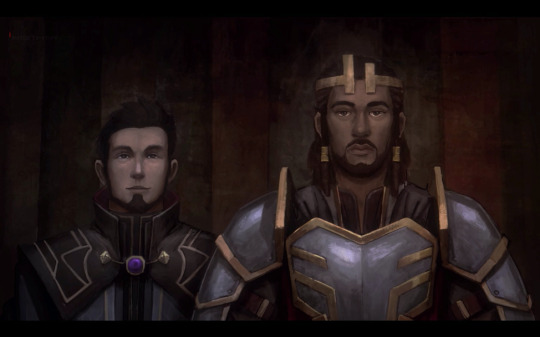
Viren: “He insisted I stand next to him in the painting, because he knew I would stand by him through anything.”
Both are curious and want to explore the depths of magic to the greatest extent possible.
Viren and Callum are also both insecure in their place in the world, relying (at least initially) on magic to help give them a sense of belonging

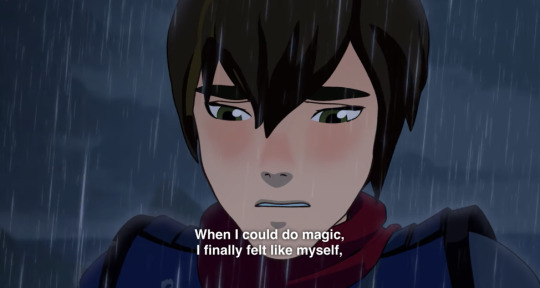
But their differences not only define their dynamic, they also define many elements and themes to the Saga, in particular as to what it means to be a hero.
To begin, Viren is great, though not necessarily good. That is to say, even though he may be capable of great deeds that save countless lives (such as in saving the people of Duren with the heart of a Titan), these deeds don’t actually make him a heroic person.
This is because every great deed he did stemmed not from altruism or compassion (no matter how well he convinced himself that it did), but from his tragic flaws: his arrogance, his vanity, and importantly, his hubris��his belief that he can subvert the natural order in his favor without consequence.
From what we can gather, Viren is a force to be reckoned with. His skills with magic have made him so powerful, he can cast a spell that would save two kingdoms from starvation.
They are also such that he’s considered by Amaya, a talented warrior herself, perhaps “the most dangerous human in the world.”
His martial prowess is quite exceptional as well, as he’s able to go toe to toe with two Dragonguards for a time. Even though they’re elite fighters and they’re flanking him, he’s able to hold his own for a while before having to resort to magic.

However, Viren is a tragic character. I don’t mean this in the sense that we should feel sorry for the power-hungry man who attempted to murder two boys and steal the throne. Rather, his “greatness” is undermined by his personal flaws, which he can’t quite shake and prevent him from being good.
Part of Viren sincerely wants to improve life for his people. When talking to Aaravos, to whom he has no motivation to lie, he states his aim is to help mankind flourish “without a knife to its throat”
He’s even willing to consider sacrificing himself, either for King Harrow or, in Lux Aurea, for his army.
Aaravos: “We’ll risk as few lives as possible. One.”
Viren: “Ah. Mine.”
But as per his hubris, he exhibits great pride in how his abilities can help mankind flourish or save his people. While he wants mankind to prosper, he wants this to be his achievement and wants people to know that he is the one who saved them.
In his story to Queen Aanya, he places a bit of undue emphasis on the fact that he was the one who up with a solution that saved Katolis and Duren. Whether or not this is what happened, it’s clear that he wants Aanya to know that he personally saved her kingdom.
A little less unclear is how necessary he ultimately was. Sarai goes back to save Viren because “without him to perform the spell, the heart is worthless, and this was all for nothing.”
I’m...skeptical as to whether this is what Sarai says, or if it’s Viren intentionally or unintentionally reading in what he wants her to say. Truth be told, Viren has no idea if this is what Sarai said because he wasn’t there when she said it. And why is the heart worthless? Viren wasn’t the only Dark Mage in the world, and probably not the only one between Duren and Katolis. There’s no reason why another mage couldn’t perform the spell.
But for Viren, the heart of the Titan might as well have been worthless because, in his mind, he’s the only capable of accomplishing these great feats.
Even when he was potentially willing to sacrifice his life for Harrow, he botched it with his speech to Harrow.

Viren: “Right now I do not come to you as my King. I think of you as my brother.”
Truth is, none of this throat-clearing is necessary. But, Viren’s not quite so humble, even when he’s attempting to do the right thing. He still wants to be seen as someone special, even when laying his life down for another.
Turns out, this was entirely the wrong thing to say to Harrow, who is put off by Viren’s self-righteousness.

Harrow: “I see the problem now. It’s that you believe you are special. Better than everyone else, above the laws of this kingdom.”
When he’s forced to kneel and Harrow calls him a servant, this infuriates Viren and he sets aside any plans he had to sacrifice himself for his King.

Harrow: “You are a servant of Katolis. You are a servant.”
Because if Viren is going to sacrifice himself, he needs people to know what a great thing it is that he’s doing. He’s not a mere servant, he’s their savior.
It’s interesting that Viren’s pride is so hurt of being called a servant of Katolis, since that’s exactly how Harrow sees himself, according to Viren.

Viren: “King Harrow worked tirelessly. He told me he thought of himself as a servant of all the people of Katolis. A servant King.”
But Viren doesn’t see himself in this way. When his potential sacrifice is treated with the same level of significance as though he were anybody else, it offends him that he has to share that importance with others.
And thus, his pride leads to his downfall, casting aside his desire to protect his King, and replaces it with a desire to be the King himself.

Viren: “Today, we must mourn sevenfold. For tonight, there will be a coronation.”
Callum, on the other hand, begins his journey on the opposite side of the spectrum from Viren. Whereas Viren can accomplish great feats without being good, Callum is a good person, though not great.
At least, not yet.
According to the main site, “Callum has a big heart, and always tries to do the right thing.”
He can be super proud of himself and his accomplishments, but he usually has enough perspective to avoid letting this get in the way of what he knows is important. For instance, he connects to the Sky Primal, something thought of as impossible for humans, he immediately shifts his attention to Ezran, never once bragging or reminding people of his accomplishments.
Corvus: That’s incredible, Prince Callum.
Callum: Thanks…uh, who are you?
And, when it comes time to laying his life on the line for others, he never hesitates. Notably, around the same time as Viren was thinking about sacrificing his life for Harrow, Callum was preparing to sacrifice himself for his actual brother, but with none of the bravado or self-righteous congratulating of himself.

Just a solemn, quiet attempt to save his brother, even at the cost of his own life, and even without anyone finding out about his sacrifice.
For Rayla, he performs Dark Magic, knowing how much she could possibly hate him for it, but deciding that her life is worth more than how she sees him.

Callum may start out with a big heart, but when it comes to his skills, well…
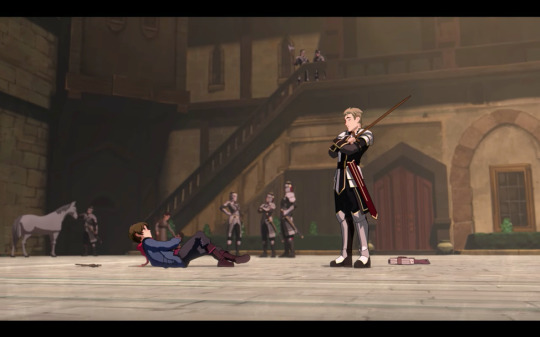
But if Viren begins as both powerful and amoral, it makes perfect sense to have Callum’s arc to begin as his opposite--someone without any special abilities but with a strong moral compass.
Because of this, we get to see him go from good to great. And his story walks this fine line, where he develops these magical abilities to perform heroic feats walking hand in hand with the realization that he doesn’t need magic to be heroic.

Callum: “It’s up to us now. We have to return this egg. We have to keep it safe and carry it to Xadia.”
Callum has the same temptation as Viren—this need to be someone important, which is a big part of his arc in S1 and S2.
In S1, he initially places a high premium on his sense of self-worth, willing to put their mission in jeopardy just so he can obtain an object that might help him become a better mage.

He assigns great importance to objects (such as the Primal Stone and the Key of Aaravos) rather than focusing on people or lives. Much in line with the way a Dark Mage would attach significance to magical components that are needed for spells.
Callum: “The truth is, its not me. It’s this. All the magic, all the power, all the confidence. It's just because of this amazing thing. A Primal Stone.”
Ellis: “That Primal Stone needs you to do all that amazing stuff. Without you, it's just a neat, glowy ball.”
Callum: “I guess so. But without this, I'm nothing. Just a guy who can draw and make wry comments from time to time. And they're not even that wry.”
Much like how Viren assigns great value to the mirror or the Dragon Egg, even above his own children’s lives.
Viren: “The egg. If you have to choose [between Soren and the egg], choose the egg.”
But by the end of S1, he realizes just how much more important the lives of his friends and the Dragon Prince are over his own sense of pride or self-worth. Unlike Viren, who places a great degree of importance to his sacrifice (honestly, Harrow should be honored that Viren would consider throwing himself on the sword for a mere king), Callum simply makes the realization of what he needs to do…and then does it.

S2 follows the aftermath of his decision, and Callum has to deal with no longer having his mage abilities. Again, he latches his entire sense of self-worth to be able to do magic.
As @raayllum points out here, he also aligns his ability to do magic to agency. Without magic, he’s paralyzed by indecision and an inability to do the right thing. He believes himself imprisoned by his inadequacy.
Callum: “If we're really going to change things, we can't just watch while humans and Xadia keep hurting each other. But how do I take a stand? Believe me, I want to go down there with you, and be the heroes who stop all the fighting and save the day, but I can't do that. I can't do anything!”
And he follows this line of reasoning to its logical conclusion:
Dark Magic

Dark Magic gives him all the power he needs. If Callum wants to be special (like Viren), if he wants to have agency and freedom for himself, this is the path he can take.
Dark!Callum: “You can have unlimited power, and you can choose what to do with that power.
And in that moment, he’s tempted. Truly, he’s tempted, to commit to this path, set himself free from his past limitations and feelings of worthlessness.
He can become like Viren, and make himself great…but in a moment of clarity, he sees Dark Magic for what it truly is.
This isn’t freedom. It’s not the power he wants.

It’s just another prison.
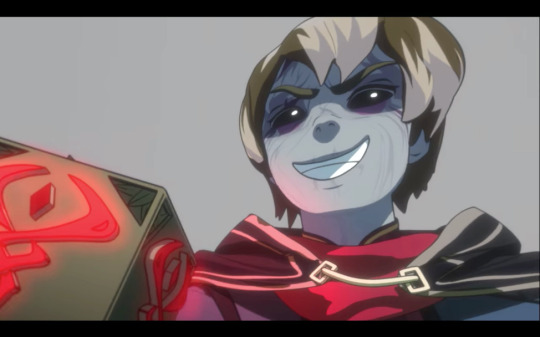
And unlike Viren, who succumbs to this temptation, Callum sees through it.

What’s noteworthy is that Callum doesn’t press on the point that it’s possible for him to learn an Arcanum and do magic some other. He doesn’t insist he can make this choice easy on himself; he chooses that, Arcanum or no Arcanum, this is not the kind of magic he will choose to do.
Callum: “Destiny is a book you write yourself!”
Instead of attaching his sense of self-worth and agency to magic, he breaks free of this toxic cycle and seizes the ability to direct his own fate.
This is a lesson that he then passes on to others.
Rayla: “What does this mean? What should I do?
Callum: “I don’t know. But it’s your choice. No one else’s.”
He finds his agency and self-worth independent of his ability to do magic, and realizes that his potential is actually in his complete control. Fittingly, it’s this realization that completes his journey to finally understand the Sky Arcanum.

In the end, Viren and Callum are quite similar, but the former lets his flaws get the better of him, his pride sinking him until he becomes malicious, grasping, and power-hungry. Eyes set on stealing the power to make him important.
The latter ascends past his prior limitations, refusing to yield to his own worst impulses.
Moreover, Callum holds on to his ideals in the face of adversity, even at his own expense, while Viren constantly tries to find “pragmatic” and expedient solutions to problems that always happen to end up with him on top of everyone else. Viren continues his dramatic decline, eagerly crossing one moral horizon after another, until by the end, he admits to Aaravos what he is really after is conquest; he’s willing to steal Zym’s life force just to become more powerful, sacrificing the entirety of his army to do it.
Callum, on the other hand, begins to truly understand what can make a good-natured person into a hero.
He expresses it in a speech about Rayla…
Callum: “It's because Rayla is a hero…Rayla saves people. She's brave. She does what's right, even if it puts her own life in danger, and even when the odds seem impossible. Even when it means her own people might misunderstand and turn against her. Rayla is selfless, strong and caring. That's what makes her a hero. That's what makes her Rayla.”
…and then proceeds to do each and every one of those things on the pinnacle. He bravely leaps after Rayla--even though it put his own life in danger--because it’s the right thing to do. Even though the odds of quickly mastering a complex spell on the way down seemed impossible.
Viren thinks his great feats are a substitute for a good character. Callum’s journey, on the other hand, is learning those character traits that make one heroic. He realizes, not only that Rayla is “selfless, strong, and caring,” but also why and more importantly, why he can be those things too.
And this dynamic between Viren and Callum culminates in the finale, where one falls…
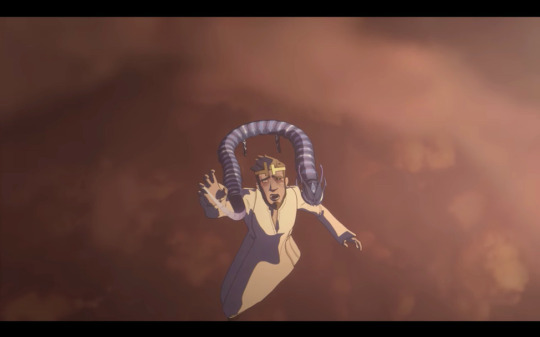
…and the other rises.
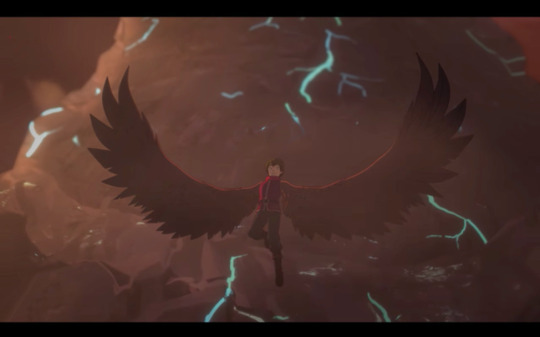
#callum#viren#rayla#ezran#harrow#tdp#the dragon prince#s2#s3#s1#aaravos#primal magic#dark magic#soren#claudia
175 notes
·
View notes
Text
DW: The Monster in the Closet
I realized while looking at a Girl in the Fireplace analysis that when Moffat involves a child in an episode, he chooses a particular set of tropes. It’s no secret he has favorite types of stories; this one I’ll call “The Monster in the Closet.” Moffat came onto Doctor Who writing Monster in the Closet stories; in fact, take a look at his first 6 stories: The Empty Child/The Doctor Dances, the Girl in the Fireplace, Blink, Silence in the Library/Forest of the Dead, The Eleventh Hour, and The Beast Below. With the exception of Blink, they all fall into this category. Why? More on that below, after we look at what the episodes share.
I’m including Night Terrors in this analysis because it’s so fitting: it’s literally about a monster and a closet. It’s actually written by Gatiss, but copies many of the same tropes and subverts the ending. I’m not including Listen, because I honestly don’t remember it well enough to analyze and don’t care for a re-watch just yet. Plus, I think Moffat was trying to branch out by that point.
Here’s what’s in a standard Moffat Monster in the Closet episode.
The Child
Fake Faces
Repetition is Creepy
The Doctor’s Reputation
The Bad Guy isn’t evil, just fulfilling its nature
The child (or perceived child) is isolated from the adults in their life who should protect them but don’t realize the monsters are real. The Doctor steps in to validate them and solve figure out how to tackle their monster, who is real.
The Empty Child/The Doctor Dances: Nancy (Jamie and the kids Nancy looks after are also contestants here.)

The Girl in the Fireplace: Reinette
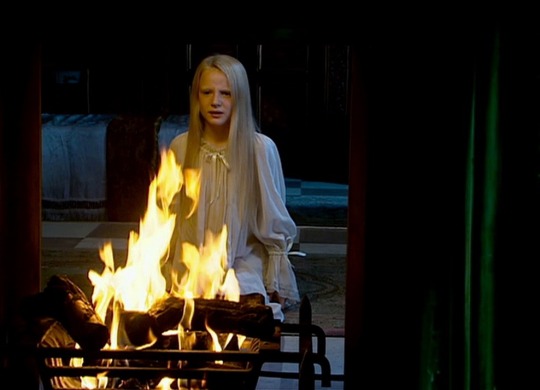
Silence in the Library/Forest of the Dead: Cal

The Eleventh Hour: Amelia Pond
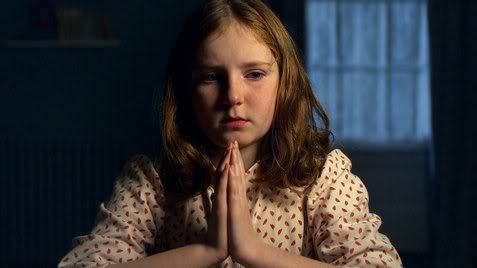
The Beast Below: Mandy (Timmy is also a contestant)
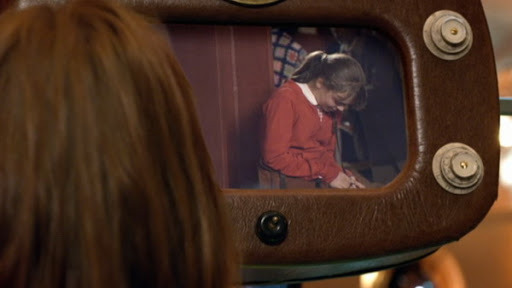
Night Terrors: George
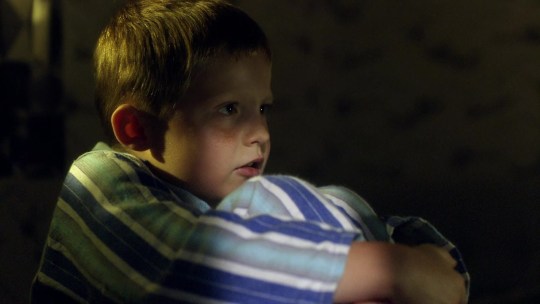
Fake faces indicate something uncanny is occurring. The two-faced nature of the monsters suggests that the monster is not what we think it is.
The Empty Child/The Doctor Dances
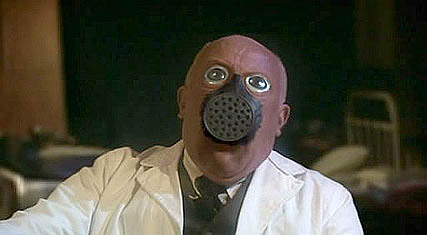
The Girl in the Fireplace
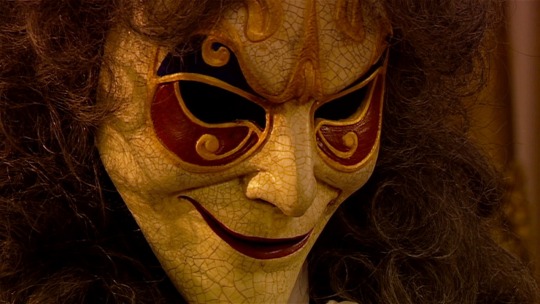
Silence in the Library/Forest of the Dead
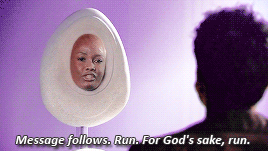
The Beast Below: (Liz 10 also has a mask and initially comes off as sinister, and is revealed to be part of the problem by choosing ignorance)
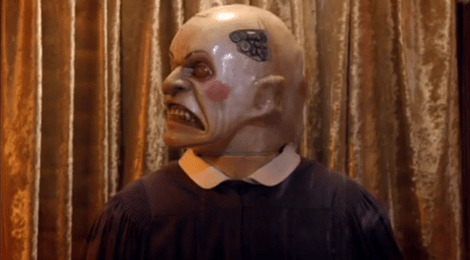
This is a bit of a stretch, but here’s the face-changing Prisoner Zero from the Eleventh Hour:
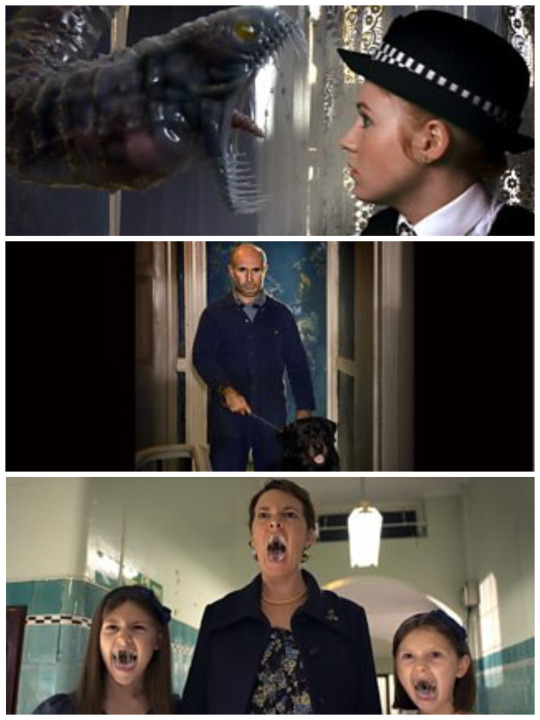
It’s worth noting that the Doctor had his own face change in this episode, so we’re waiting to see if he’s the genuine article or if he’s more like the monsters.
Night Terrors. Doesn’t get creepier than this.
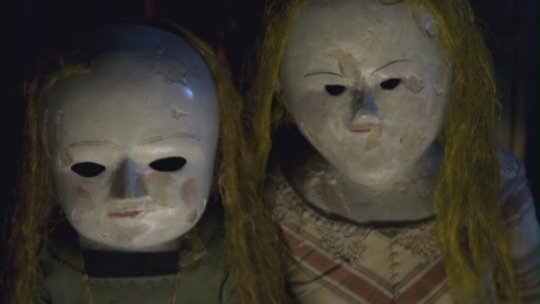
Repetition is creepy. This doesn’t really serve a narrative purpose beyond being creepy, other than perhaps to indicate the monster has a goal that we do not understand. When we do, we can solve the problem. This kind of reminds me of when a kid is trying to get their parent’s attention, but they’re on the phone and don’t really hear. I find that just like fake faces, the more often this is used, the more banal I find it.
The Empty Child/The Doctor Dances: Creepiest thing ever
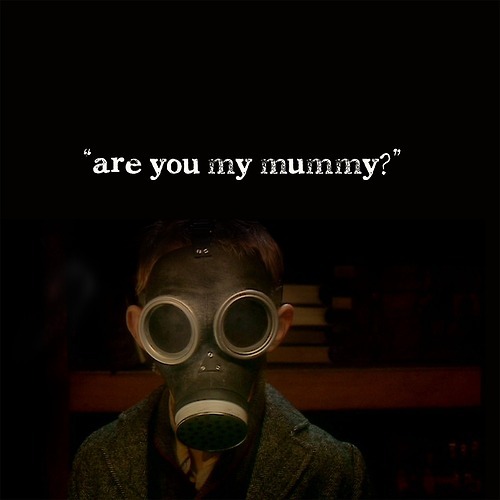
The Girl in the Fireplace: What is that mysterious ticking noise?
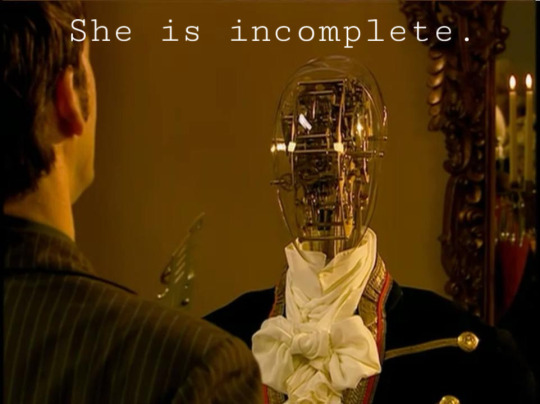
Silence in the Library/Forest of the Dead: (so much repetition here that any episode after it that uses repetition feels like overkill to me)

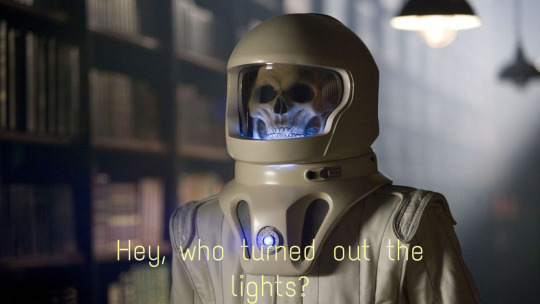
The Eleventh Hour:

The Beast Below does something a little different. It goes for a creepy nursery rhyme instead:
GIRL: A horse and a man, above, below. One has a plan, but both must go. Mile after mile, above, beneath. One has a smile, and one has teeth. GIRL: Though the man above might say hello, expect no love from the beast below.
Night Terrors:
DOCTOR: George! George, what's going on? Are you doing it? ALEX: What's happening? GEORGE: Please save me from the monsters. Please save me from the monsters. Please save me from the monsters. Please save me from the monsters. DOCTOR: George, no! GEORGE: Please save me from the monsters. Please save me from the monsters. Please save me from the monsters. ALEX: Help me, Doctor! GEORGE: Please save me from the monsters. DOCTOR: George, no! (The Doctor is dragged back into the cupboard.) GEORGE: Please save me from the monsters. Please save me from the monsters. Please save me from the monsters. (Alex is dragged into the cupboard.) ALEX: No! (And the door slams shut. Peace reigns again.)
Line about Doctor’s reputation scaring off the bad guys: The Doctor acts as a parental figure, but instead of dismissing the childish fear of the monsters, he validates and vanquishes. He fulfills a parental role, though, and just as parents scare away monsters by virtue of being an adult, the Doctor scares away monsters just by being the Doctor.
*The Empty Child/The Doctor Dances: Saving this one for last.
The Girl in the Fireplace:
DOCTOR: Even monsters from under the bed have nightmares, don't you, monster? YOUNG REINETTE: What do monsters have nightmares about? DOCTOR: Me!
Silence in the Library/Forest of the Dead:
VASTA NERADA: These are our forests. They are our meat. DOCTOR: Don't play games with me. You just killed someone I liked. That is not a safe place to stand. I'm the Doctor, and you're in the biggest library in the universe. Look me up. (The Vasta Nerada desists and gives him a day to evacuate the library)
The Eleventh Hour:
DOCTOR: Okay. One more. Just one. Is this world protected? Because you're not the first lot to come here. Oh, there have been so many. (The projection shows the Daleks et al.) DOCTOR: And what you've got to ask is, what happened to them? (A run through of all the previous Doctors, then this Doctor steps through the projection with a jacket and bow tie.) DOCTOR: Hello. I'm the Doctor. Basically, run.
The Beast Below:
This one breaks the mold a bit: It’s Liz 10 who does all of the “fear my reputation lines” and pulls almost the same line as the Doctor in 11th hour (I'm the bloody Queen, mate. Basically, I rule). What ties this to other Monster in the Closet episodes is that problem’s solution comes from realizing how amazing the Doctor is, and applying that logic to our misunderstood Starwhale. Since it doesn’t need to be scared away like our past few monsters, we get this instead:
AMY: The Star Whale didn't come like a miracle all those years ago. It volunteered. You didn't have to trap it or torture it. That was all just you. It came because it couldn't stand to watch your children cry. What if you were really old, and really kind and alone? Your whole race dead. No future. What couldn't you do then? If you were that old, and that kind, and the very last of your kind, you couldn't just stand there and watch children cry.
AMY: Amazing though, don't you think? The Star Whale. All that pain and misery and loneliness, and it just made it kind. DOCTOR: But you couldn't have known how it would react. AMY: You couldn't. But I've seen it before. Very old and very kind, and the very, very last. Sound a bit familiar?
Night Terrors:
Again, the formula’s changing. Here, the Doctor’s title declaration triggers the monster and makes the scary stuff happen rather than the other way ‘round because the resolution is reconciliation between parent and child. If the Doctor were to be the substitute parental figure, he would interfere with that reconciliation.
GEORGE [memory]: Who are you? DOCTOR [memory]: I'm the Doctor. GEORGE [memory]: A doctor? Have you come to take me away? Away. Away. Away. DOCTOR: That's what did it. That's what the trigger was. He thought you were rejecting him. He thought he wasn't wanted, that someone was going to come and take him away.
(It should be noted that there’s still a title declaration where the Doctor assumes that people should know and respect his title, even though they have no logical reason to:
DOCTOR: I'm not just a professional. I'm the Doctor. ALEX: What's that supposed to mean? DOCTOR: It means I've come a long way to get here, Alex. A very long way. George sent a message. A distress call, if you like. Whatever's inside that cupboard is so terrible, so powerful, that it amplified the fears of an ordinary little boy across all the barriers of time and space. )
So that brings me back to The Empty Child/The Doctor Dances. One of my huge Doctor Who pet peeves is the Doctor’s growing hubris. I could manage it in seasons 2-4 because everybody and their dog was calling the Doctor out when he went too far, but it just kind of stopped in season 5 and the Doctor threw out more and more lines about how great or scary he was.
What I love about Nine is that he’s humble. What? you ask. The man who told us “I am so impressive!” is the most humble? Yes. Despite his “devil may care” blustering, Nine carries a huge burden of guilt and he constantly questions whether or not he has the authority to make big decisions when lives are at stake. It’s no coincidence that Harriet Jones pulls the “I’m the only elected official” card in World War Three to tell the Doctor to save the world even if she and Rose might die, or that when the Doctor acts unilaterally to let the Gelth posses corpses in The Unquiet Dead, he’s wrong, or that his actions to free the human race from the brainwashing news just leads to societal collapse and allows the Daleks a place to lie in wait, or that he’s spared from deciding Blon’s fate in Boomtown by the TARDIS. It all leads to his decision in front of the Daleks: Coward or killer? Do I have the right to decide who lives and dies? His answer is no, I don’t (then Rose saves the day).
In keeping with his personality, it would be totally out of character for him to boast of his reputation to scare away the monsters. Instead, we get this beautiful inversion of the Monster in the Closet Doctor/Parent figure scaring away the monsters by virtue of title:
DOCTOR: Amazing.
NANCY: What is?
DOCTOR: 1941. Right now, not very far from here, the German war machine is rolling up the map of Europe. Country after country, falling like dominoes. Nothing can stop it. Nothing. Until one, tiny, damp little island says no. No. Not here. A mouse in front of a lion. You're amazing, the lot of you. Don't know what you do to Hitler, but you frighten the hell out of me. Off you go then do what you've got to do. Save the world.
Instead of an “I’m the Doctor! Monsters are scared of me!” line, we get the Doctor saying ‘the monsters are scared of you.’ Then, he says he himself is frightened of humans. That’s an odd thing to say, since Nine doesn’t act frightened of humans and seems to just love them, until you consider the thematic implications. Who’s scared of the humans? The monsters.
The Doctor from ‘Dalek’ is calling.
The Doctor considers himself to be one of the monsters, even if he’s trying to atone for his past. He’s desperately avoiding whatever reputation’s left after the Time War and doesn’t pull that card until he’s facing a Dalek army. I am so so so grateful we got this line, instead of a line about how great the Doctor is.
The bad guy is not actually malicious, just following its nature: The monster is always something real here, but it’s never properly evil. I do like a good “the aliens just have different needs than humans” plot. That said, it can get predictable when you know there’s going to be a twist coming. I like the twists less and less as the episodes go on.
The Empty Child/The Doctor Dances: The monster is the child! Sort of: the good-at-healing but bad-at-AI nanogenes made Jamie and everyone else a monster since they didn’t know what they were going for as they repaired the humans.
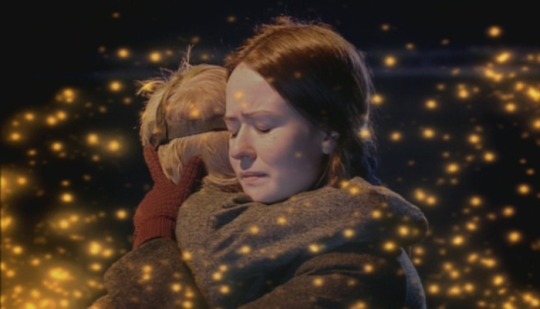
The Girl in the Fireplace: Arguably the most sinister on this list, the droids aren’t malicious, just trying to repair their ship with re-purposed body parts because they broke down. Not evil, just following incomplete AI instructions like our Nanogenes. This was the only thing I liked in this episode. At least the monsters had a reason they were obsessed with Reinette, unlike the stalker-y actions the Doctor took that were supposed to be 100% okay, even though he criticized the Robots for doing that?
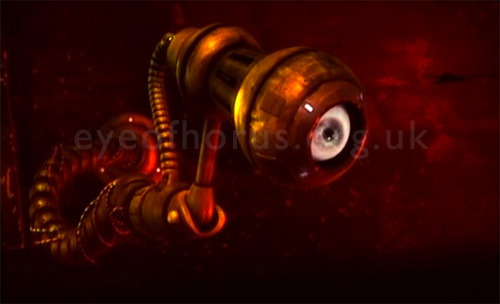
Silence in the Library/Forest of the Dead: The Vasta Nerada are creepy and eat people, but it’s just because their forest was pulped and they came here in the books! They just want to be left in peace to hunt like normal predators.
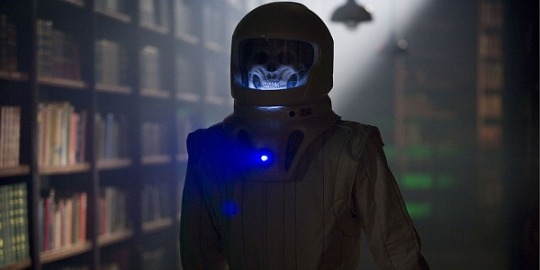
The Eleventh Hour: This one doesn’t fit quite so neatly. However, it should be noted that the primary danger in the episode doesn’t come from the bad guy, Prisoner Zero, but the cops looking for him who are willing to boil the earth. They’re not evil, just callous and need to be reminded of proper boundaries.
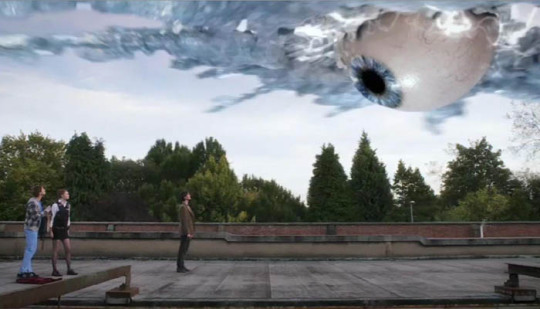
The Beast Below: The weird scorpion stingers are just the Starwhale! It loves children. It doesn’t even care about being tortured for centuries and will keep driving everyone through space.
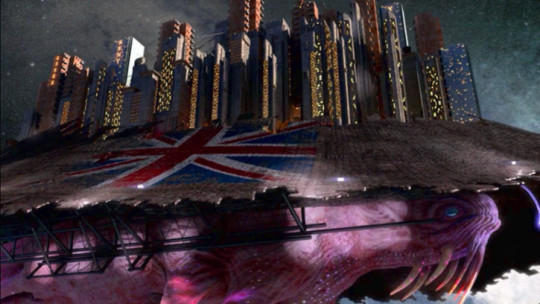
Night Terrors: George is monster! That is, he’s the one causing the creepy stuff to happen because he’s an alien who stressed out about the parents he brainwashed abandoning him. I guess that’s sci fi for you?
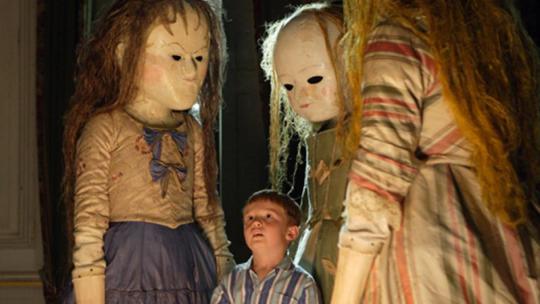
With the exception of Blink, all of the monsters are shown as innocent, if dangerous. They just need to put their energy in a different direction. It’s not until Victory of the Daleks that Moffat breaks the mold. Why? The punchline of “Monster in the Closet” stories is that the monsters are real and scary, but not evil, just following their nature. Daleks fall into the “these are actual bad guys” category, not the misunderstood monster. (Which is kinda funny, because it’s been established that Daleks are genetically engineered to kill and hate. They may be a Nazi analogue, but Nazis were people who chose evil. The Daleks are bred to hate and exterminate--note what happens to the “impure” dalek in Dalek and Evolution of the Daleks: they don’t kill people, and then they die.)
My biggest beef with these episodes that they’re all relatively close together, so it’s easy to notice the overlap. When Moffat uses almost the exact same line in one episode as in the previous episode, I notice. When he uses the same mask design, I notice. When he has a constantly repeated line and does it again, I notice. Even before I waded into anti Moffat stuff, I noticed a shift at the end of season 4. I attributed it to a new cast since I just couldn’t click with anything. Then, I learned there was a new writer, and found out he had also written my least favorite episode of New Who (The Girl in the Fireplace).
After writing this, I can’t help but parrot what I’ve heard elsewhere: Moffat’s trying to write a fairytale. A lot of the people and dangers feel more like archetypes than people, and the dialogue is witty but often unnatural--nobody goes around bantering like that all the time. The villains are identified by their form just as much as what they intend to do. There’s also this weird idolization of childhood and the innocent child. I don’t like it much. I’m more of the Coraline, Witches of Worm, Egyptian Game, and Wrinkle in Time mold, where the kids are just as realized and human as their adult counterparts and can lack empathy and be as creepy as adults. Alternatively, I’ll take Shannon Hale’s fairy-tale retellings where the bad guys are people and the solution involves personal courage and collaborative effort. (Moffat can keep his Day of the Doctor maypole children, and I will keep Chloe the scribbler, even if her episode was a little off).
My rating for these episodes, from least to most favorite:
The Empty Child/The Doctor Dances: Love Christopher Eccleston’s performance and was very creeped out by the child monsters. The solution to the problem was implied but not obvious so I didn’t get it until I was supposed to. I didn’t enjoy the introduction of a love triangle or the constant innuendo, but at least it was gone in an episode. Also, I will never not fangirl over “Everybody Lives!” and its significance to Nine.
Silence in the Library/Forest of the Dead: Thoroughly enjoyed these episodes, though I do have things to quibble with (wish Lee was black like Donna’s other romantic interests--she’s got a type and it’s not “gorgeous and can’t speak a word,” among other critical things). Overall, a great episode
The Eleventh Hour, which I enjoyed, but makes me feel weirder and weirder the more I watch it between child/adult Amy, handcuffs and porn references, and the annoying “prisoner zero has escaped” mantra, plus “I’m the doctor! The earth is protected! I also didn’t like the repeat of comatose people sitting up and saying things. It was good the first time, not so much the second. Funny, but also uncomfortably awkward and creepy, and not in the “are you my mummy” way.
The Beast Below, which felt like it was recycled from earlier tropes to me. Maybe if Liz 10 wouldn’t have had the GitF porcelain mask, I wouldn’t be as tempted to compare it to other Monster in the Closet episodes. Overall, just meh.
The Girl in the Fireplace, which rubs me wrong in every way, except for the droids cannibalizing crew to save the ship--what does that say about me and the episode? I will not rewatch this episode willingly.
#anti moffat#analysis#dw meta#amelia pond#the girl in the fireplace#9th doctor#ninth doctor#10th doctor#tenth doctor#11th doctor#even if this is moffat analysis#i feel like it's too anti to tag it with a plain moffat tag#doctor who#doctor who meta#the monster in the closet
43 notes
·
View notes
Text
Honour and Curse #11

Honour and Curse #11 Mad Cave Studios 2019 Written by Mark London Illustrated by Nicolás Salamanca Coloured by Tekino Lettered by Miguel Angel Zapata Yua confronts Master Yazuro about her father's death and Akemi decides to make peace between the Iga and the Koga. Sawa's killer is finally revealed, paving the way for the explosive finale of the second arc. This story is one of my favourites because it focuses on a culture and a tie that is so foreign to the Western World and it’s told so beautifully. Over the first and this second arc we’ve seen Genshi come to terms with the creature that resides inside him as he learns to harness the power it gives him while Lady Akemi has come to hate the man she once loved blaming him for her fathers death. It has truly been one of the closest stories to a night time soap opera as we’ve seen in comics. With lies, intrigue, deception, misdirection and all out action it’s continues to be one heck of a thrillride issue after issue. Plus just the fact that honour means something to these characters in ways that are harder to comprehend in today’s world and reminds us that a man’s word is his bond is something that we should still be living by today. I love the way that this is being told. How we see the story & plot development through how the sequence of events unfold as well as how the reader learns information is presented perfectly. Learning lessons the hard way and overcoming pride and hubris isn’t easy but to see it portrayed in the characters the way we do makes the character development utterly magnificent. How we see the dialogue, the character interaction and how they act and react to the situations and circumstances that they encounter continue to shape who they are and who they are becoming. The pacing is superb and as it takes us through the pages revealing more and more of the story alongside the twist & turns along the way pulls us into this in some really magical ways. I am very much enjoying the way that we see this being structured as well as how we see the layers within the story continue to grow, evolve and strengthen. It’s the way these layers are seen throughout the story that give it depth and complexity and make us want to be a part of this world. How we see everything working together to create the story’s ebb & flow as well as how it moves the story forward is perfectly achieved. The interiors here are a nicely done. The creativity and imagination in what we see is special and the tengu is meant to have this awesome and fearful visage. I do wish we’d see more backgrounds being utilised, especially with Fanuk changing as that could’ve been a tad more claustrophobic in my humble opinion. How we see the linework, its varying weights and techniques in being utilised to create the detail work is nice ot see. The utilisation of the page layouts and how we see the angles and perspective in the panels show a solid eye for storytelling. The colour work is nicely rendered as well. The gradation effects are beautifully rendered and how we see the various hues and tones within the colours being utilised to create the shading, highlights and shadow work is great to see. This is one of those weeping Eastern epics that takes the fantasy of a sword & sorcery genre to new heights. Mark is writing a spectacularly intelligent story with a cast of diverse characters, warring tribes and trying to come into a new era of friendship and peace that’s in jeopardy thanks to the chaotic nature of Fanuk and his Tengu. There is this inherent excitement and intrigue in what we see and a tension to it that makes you wonder if Genshi took too long in trying to reign in his own Tengu or if they can work together in a way that will save the woman he loves and the kingdom as a whole.

1 note
·
View note
Text
Rant about Frankenstein
Because honestly what the fuck else would I do? Elizabeth, Justine, and Caroline are my favourite characters and Adam’s misunderstood but not in an owo sad boi way. Because honestly what the fuck else would I say? Y’all know me by now.
Hey did anybody else have to read Frankenstein for gradeschool? Because Jesus Christ, that book was unbelievably horrible. Victor is irredemable in so many ways, he gets a twelve-year-old girl killed because he doesn’t want to take responsibility for his own crimes, and also he marries his sister. 🤢
....... And this is the guy whose pain we’re supposed to be sympathizing with???? Like NO THANKS??!!!
His whole family is horrible by the way? His dad married a woman young enough to be his daughter who, more importantly, was almost wholly financially dependent on him at the time when he proposed and therefore could not properly consent? Like ... she had to choose between abject poverty and him and that’s not a real choice at all? They pretty much kidnapped Elizabeth who had her own family and it’s implied that she never got to see her real parents again. Do you know how unbelievably traumatizing that would be? They pretty much kidnapped Justine too though they let her see her family occasionally which doesn’t change the fact that she had to go so long without them when she was just an elementary school-aged child. And also they made her do child labour. While letting their teenaged son just lie around in a boat for no reason. And Victor pretty much kills her later to save himself. If you read between the lines you can see that they groomed Elizabeth and arguably even Victor from a disturbingly young age to marry each other (despite the fact that they grow up in the same house with the same adults and are therefore siblings). Neither child really has another option for people to marry it what to do with their lives and they both grow up knowing they’d inevitably end up married to each other as their father wants. Which is disturbing. That’s incredibly disturbing. Unbelievably disturbing. The way young-child-Elizabeth is described is too womanlike fo be describing a child? The same thing happens when describing Victor’s youngest brother? Who dates a five-year-old when he’s like eight or nine? Like I’m aware that kids date but that’s a fucked up age difference for two people so young and it’s described so creepily.
And honestly Victor’s whole family is so disturbing? But the worst part of it is that his family isn’t described as disturbing. They’re described as such good people and such a sweet, loving, perfect family. They’re painted as do benevolent and kind and generous. And like ... they’re not? At all? They’re abusive, exploitative, and predatory? I mean except the women but the women are all the victims of the men. And it’s painted as this pure, innocent, loving thing. We even talked in class about how perfect and loving his family is.
And I want to talk about the female characters. Caroline, who got coerced into marrying a “good, honest, benevolent” man under the implicit threat of destitution, sacrificed her life to save Elizabeth. Elizabeth, who gets kidnapped a groomed, is the only one who truly feels sorrow for Justine’s death. Sure the other members of the family mourn, but it’s just for show. There never is the deep, caring, vulnerable, emotional aspect to it. They go through the motions of mourning because it’s what’s right. You can tell because Victor had ample chance to save Justice but didn’t even try whatsoever at all because he wanted to save his reputation. Despite the fact that he’s much older than Justine. And the way he mourns is the same hollow way the other men in the family mourn. But Elizabeth’s mourning is so much more raw and agonized and real. Because they understand each other. They share each other’s pain. And Justine herself, from the little we see of her, is also shown to be a deeply loving girl. She holds a picture of her real/birth family close to her at all times. Her displays of love are not grand, ornate, and ultimately hollow like the men. They’re simple, and humble, and genuine, and pure. The women understand what live us, and what emotions are, while the men don’t.
I don’t believe this is intentional though, despite the book being written by a female author, because every single time the men are described they’re described as perfect and flawless while the women are described as pretty and beautiful and “oh they love the men so much” and that’s it. But their actions betray the truth of the profound deep ness and wisdom of their characters. And given how you know how like, what we see in the world informs how we write about it, subconsciously, right. Well Mary Shelley probably unconsciously write about the strength, camaraderie, compassion, and empathy she has seen but hasn’t consciously noticed, without even noticing it.
You might tell me, oh wow Mary is a female author why would she be misogynistic?
You need to remember that internalized misogyny is one hell of a beast. Twilight, Fifty Shades of Grey, After, Dark, and so many more misogynistic trash books were all written by female authors. And also the difference between Mary and her female characters is that Mary was from a rich family whereas every single one of her female characters in this book were from a poor background and class is an even more impactful praxis than gender and multiple axis often intersect in very strange and horrible ways.
Back to the story.
And obviously everything that goes on when Victor goes off to university is horrible. And so many people talk about how it’s horrible for Adam but they never truly realize the pain that Adam is in. Apart from being Victor’s son and being thoroughly abandoned, and feared, and even hated by his father Adam is forced to live in a world that shuns him and sees him as a monster.
Adam is, in my opinion, the only redeemable male character in the book. Despite having no control over his emotions, his emotions are real. Adam is alone. Justine is alone. Elizabeth is alone. Caroline is arguably alone. The violence the Frankenstein family inflicts upon the members it considers lesser is unimaginable. Adam is alone, is lesser, is pretty much forced to grow up on his own because he failed to meet expectations. Victor is so full of hubris and ego. And honestly, at least this gets addressed but he never is truly held accountable by the narrative. He has such a goddamn high opinion of himself and thinks he can do everything. He never thinks of the fact that the guy he creates will be their own person. Victor views Adam as an extension of himself and his glory. And when Adam commits the “crime” of not living up to Victor’s expectations Victor abandons him immediately. Because Adam was supposed to be a monument to Victor’s glory, to Victor’s artistry, to Victor’s intelligence, Victor’s power. And he wasn’t that. He was a young, flawed child in need of guidance and support, guidance and support he never received.
So this all begs the question. Why did Victor feel the need to create Adam? Because truly, as messed up as Victor’s family, they are messed up in a different way. Victor, growing up his family, was always the darling. Always the centre of attention. Always adored and fired and called genus. For existing. When he went off to university, this was not the case. He was a bright student but he was one student of many. He was not special just because. Whatever position he had he had to gain somehow. And I’m not saying meritocracy is good, it isn’t. But it was a different system than what he grew up in and for the first time he wasn’t so close to the very top. Of course that would deeply “hurt” a man as coddled as Victor was. Of course that would drive him to need to “prove himself.” It would drive him to need to show that he was glorious. And he needed Adam to prove his worth to them and gain his position.
Everyone talks about how Adam’s actions were irrational, borne of over-emotional passion and disregard for the morals of polite society. They don’t see that in the face of extreme, unbearable psychological and even sometimes physical trauma m violence the only way forwards is with violence if your own. Think of it as do-it-yourself Karma.
Adam was alone. Justine was alone. Elizabeth was alone. Caroline was alone. But Adam had so much privilege - and yes it is privilege - that the others don’t have. Adam is free. Adam does not fit into the society and all its class-divides, gender-divides, race-divides, religion-divides, and other divides. He doesn’t have a place on the hierarchy. Or in society. He exists in his own sphere. And is beholden to none of the rules if said polite society. He doesn’t have to surround himself with people who want to exploit, abuse, and control him. He doesn’t have to do what they say. He doesn’t have to fake gratitude. He had the type of freedom that Justine, Elizabeth, and Caroline deserve but do not have.
I’m being rejected by society Adam retreated into the wilderness and lived in nature. I believe there is something deeply poetic about that. Because the wilderness is the origin and the end.
But anyways, Adam didn’t know how corrupt the Frankenstein family was. He didn’t know many things. But he knew rage, and he knew violence.
And he knew how to kill.
And it was so cathartic in a strange, subconscious way to see the Frankenstein family’s downfall. I mourned Elizabeth and Justine’s deaths. I seriously mourned them. But they were the only ones. And I still felt a sense of peace and calm at their deaths. Because now they’re free from their nightmare lives, right? Elizabeth, especially. Because she was getting so close to her wedding night. She was getting so close to the time when she would have to sleep with the child of her kidnappers, who she grew up with, who she was raised to be a wife for. That’s not good. So it was actually a relief that he died before she could consummate that sham of a marriage. Elizabeth and Justine were beautiful, radiant souls that deserved to be in the world. But at least they’re free. They deserved to live. Big they also deserved freedom. Not either/or. Both. But still. If you ask me freedom is worth more than life. If humans had not been so neurobiologically wired to stay alive I would have happily died years ago.
And the Frankenstein men. Their deaths are viewed as such tragedy. They are so deeply mourned. We are made to feel heir loss so deeply. And we are meant to feel grief and terror for them. But I don’t. It feels so deeply, morbidly satisfying to see them finally be the ones that suffer, to see them finally be the ones that grieve.
Especially if you consider the class issues that pervade the whole book. They live in early Industrial Revolution Switzerland, a place drowning in poverty, death, and misery that the comfortably wealthy are shielded from. It’s good to finally see the iron bars if destiny bent in a shape they’re not supposed to be in. It’s good. Cathartic. Not terrible and unholy as the narrative would have you believe.
And that family is finally smites from the Earth. Gone. Rooted out. Along with all their festering corruption. And in his last grand, holy, martyric act Adam Frankenstein let’s the cold winds of the Arctic wilderness carry his spirit into death.
And though Victor is portrayed as a tragic, sensitive genius from a respectable family with a fatal flaw that destroyed him in the end, he was truly a rich, male, coddled, spoiled man-baby from an overprivileged and corrupt family who raised him to be who he was. And the men of the family, including the youngest and estranged son Adam, were all destroyed by their corruption.
But what else do you expect in a novel written by a rich lady of upstanding background from Georgian England of all places and times?
1 note
·
View note
Photo

HERE STANDS SOLIYA TORMA OF THE AIR NORMADS, THIRTY ONE YEARS OLD AND THE FIRST BORN OF COUNCIL MEMBER RINZEN
she is the firstborn of a man who knows not to limit his offspring to archetypes, for their element is air — it’s fluid and dynamic and though it never refuses whichever way it goes, it never stays in one place for long.
but she’s the cause of his first few greys, and the reason for many of her mother’s migraines, for she is stubborn and unyielding almost from the first breath she takes. temper tantrums last for hours, and a refusal means an unyielding no, even as a babe.
as the first child, she is not conscientious, she is not careful. she is not reliable.
she boldly steps into the space where no older sibling has stepped before, and ends up with bruises and scrapes up and down her legs and arms, some scabbing for years before adolescence hits and her body starts to change.
her affinity for airbending surprises everyone — most of all, her father.
the skill runs in the family (her lineage is almost legendary) but with her temperament and her pride and her rigidity…many people wondered if she were better suited for any other element.
with each concept that is conquered, her hubris grows; her ego and her mischievousness knows no bounds. her mother worries about the path her first born will walk down, so unlike all the other air nomads that live on their island. her father is weary as well, but there is a part of him that is proud, naturally. still, he wonders but mostly he worries.
things calm down when her younger siblings are born. she is a doting older sister, but that disposition doesn’t last long before her ego flashes its teeth once more.
self-discipline is a hard lesson learned when she injures her younger sibling in an uncontrolled outburst, and the guilt weighs on her for many weeks after, long after the injuries have healed, and the hard feelings released into the wind.
she retreats into herself for an even longer time after everyone thinks the loose ends from the accident are done and tied. however, it is months before she practices air-bending again.
in this time, she finds comfort in other things rather than her own accomplishments.
meditation helps. tremendously.
she is humbled by her mistakes, and her father truly begins to take her under his wing as she turns this new chapter. this new form of his eldest…this, he can work with, can guide — can teach.
but you cannot completely quell something that is so innate. it simmers low under her skin for many years, but as she matures she gets better and better at wielding it, turning it, and exhaling it out with even-paced breaths.
what she can’t release she squeezes and presses, applies so much pressure until she thinks self-deprecatingly, that under any other circumstance it may turn into a diamond.
but of course, it’s nothing as glamorous or as shiny as a diamond, but whatever it is — she thinks that she can at least hide it in her rib-cage, behind her heart. it’ll just have to live there for the rest of her life, she affirms.
and it works.
(for the most part)
2 notes
·
View notes
Text
Far Cry 5 Theory #3- Faith And The Greek Goddesses
Hi all, and welcome to the third in a series of Far Cry 5 meta posts! Today, I’m talking about the often sadly overlooked, beloved little sister, Faith! It’s not an original theory this time, instead I’m building on already existing and acknowledged symbolism within the game!
This one is 1972 words, so another long one, but I hope it’s interesting!
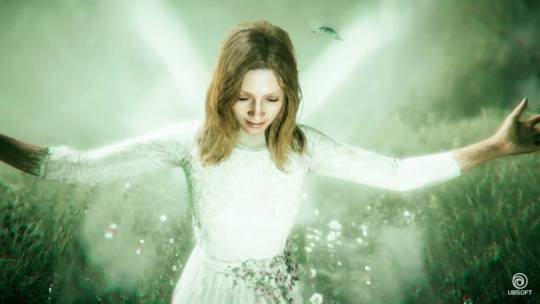
Far Cry 5 is laden with Christian symbolism- talk of God, baptism, souls and sins- but there is one very interesting example of where this trend is broken. This moment comes within the scene where Faith entices Burke to kill Virgil, and then himself.
As she approaches her victims, she says to the Deputy:
“Do you know what hubris is? Arrogance before the gods. The Greeks saw it as a dangerous form of pride that invoked the goddess Nemesis, who would seek retribution.”
This is the only example in the entire game (and indeed, the supporting materials) where the situation’s religious undertones are blatantly derivative of Greek mythology. And while Faith is heavily under the influence of Joseph’s doctrine and ideology, I feel that this very deliberate reference can shed some light on how she decided to play the new role she had been given.
Not just as a Herald... but as a goddess.
Aphrodite. Cybele. Psyche.
Nemesis.
Nemesis is the Greek goddess of retribution, justice and revenge, a figure who punishes arrogance and pride.
Immediately after making this reference, Faith goes on to say:
“If violence is the only language you choose to speak, I’ll speak your language.”
She directly places herself in the role of Nemesis, deciding that she must combat the Deputy’s violence, their hubris, by retaliating with Burke and Virgil’s deaths.
Faith is the only one of the Seeds who actually punishes the Deputy’s actions.
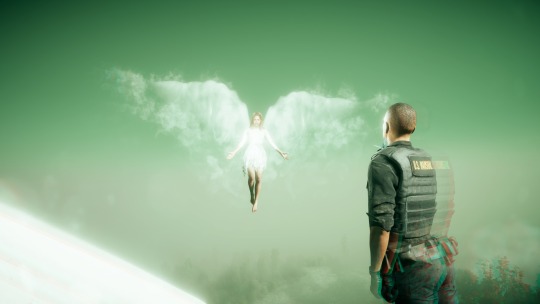
INSPIRATION
Due to this reference, it appears that Rachel took heavy inspiration from the Greek mythology when performing her role as Faith. It has been discussed before (in this post by teamhawkeye and weekend-writer) that she may have learned how to be a Herald from Jacob, since she directly quotes him within the game, and I also think that all of Jacob’s talk of humanity, history and falling empires may have influenced her to look at the ancient societies, to understand the faiths that made their empires so strong.
She would learn of their all-powerful gods and of cruel punishments administered to those proud enough to challenge them- think of the fates of Medusa, Arachne, Marsyas and Tiresias.
And seeing how successful the ancient gods were at eliciting respect and obedience, she decided to put their methodologies into practice.
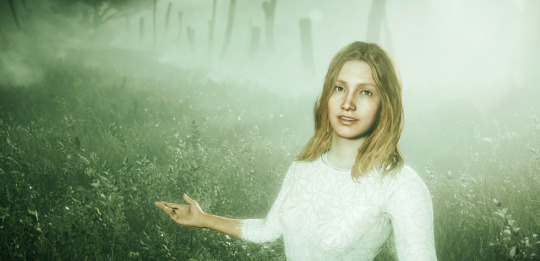
BUT WHY?
Delusions of grandeur.
It’s easy to imagine, that having been once cast out from society, Rachel might become enamoured with her new position as a Herald, as the one Joseph hand-picked to be at his side. She rose from nothing to become a leader, loved and feared. She now held the ability to control people entirely. She was now divine.
It’s pretty likely that power went to her head.
I have been considering the possibility that Faith believes she is supposed to act as a deterrent for Joseph’s own hubris. Joseph would worry that to wield the power he has, and to carry the notion that he is chosen by God, may make him arrogant and tyrannical, and he would need someone to keep his pride in check. Greg Bryk has discussed how Faith is a motherly figure to Joseph- who better to aid him in a battle with his own sins than a parental figure, just as he, as a ‘Father’, aids the atonement of his flock?
But why would Joseph ask her to take inspiration from an ancient religion that isn’t part of the Eden’s Gate doctrine? Why would he raise her to be a godly figure, when he and his brothers were simply prophets?
He wouldn’t.
So maybe Faith, with talk of her divinity as her new form of cocaine, combined Joseph’s request to assist him, her developing delusions of grandeur, and the ancient stories she learned from Jacob, to come to the conclusion that she was special, chosen like the heroes of old?
And so she decided to become a goddess, as evidence of her worth.
Faith wasn’t named by the Voice in Joseph’s original visions like John and Jacob were, and I imagine she’d be aware of that. Perhaps she felt bitter, outcast, not quite part of the group. A Herald, but not a prophet. A Jessop, not a true Seed.
She knew she must have a purpose, after all, she was chosen.
Perhaps she was chosen as a guide for the prophet, so that he might remain humble and loyal to his holy cause?
SO WHAT PROOF OF THIS IS THERE?
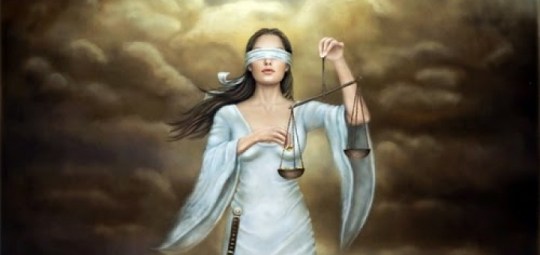
HER ORIGINS
Nemesis is the child of Nyx, the goddess of night, and Erebus, god of darkness. And so it can be argued that she was quite literally ‘born of darkness’. Both Nyx and Erebor were born of Chaos which the Greeks described as a formless, eternal dark abyss between the Earth and sky, or upon which the Earth rests.
In one of Faith’s broadcasts, she can be heard saying ‘Life comes from chaos’.
The Greeks' dark void, Chaos, was worshipped as the very first thing to exist.
It seems too much of a coincidence for her to make this statement, a sentiment not shared by any of the other Seeds, if she had not been influenced by Greek mythology. And it could be that Faith’s belief in this doctrine comes from the parallels it has with her own story:
“Faith flies divine—and Rachel…Rachel gropes around in the darkness. I left her there a long time ago.”
Rachel was born into a world of darkness, by abusive parents. She tried to remake herself using drugs, but still was lost in the ‘chaos’. It was only when Joseph found her that she finally became ‘Faith’... that she became ‘Nemesis’ and came into the light, ‘born’ as the person she was meant to be.
There are also interpretations where Nemesis has no father, which is all the more interesting, considering Joseph’s epithet.
SYMBOLISM
The above depiction of her is especially interesting, as Nemesis holds two of her symbols- that of scales, and a sword. These are the very symbols of her adoptive brothers. We have little insight of how Faith interacts with John and Jacob, but we know that Joseph apparently dotes on her. Perhaps, if she is indeed consumed by the notion that Joseph chose her, made her a favourite, that she feels she has some degree of control over them too?
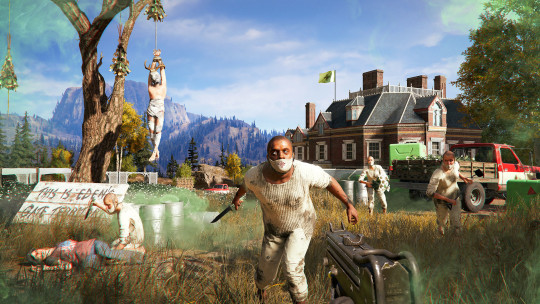
THE ANGELS
Faith appears to have taken inspiration from Nemesis in her manufacturing of the Bliss, and the effects it takes upon those consumed by it.
The Angels are overdosed so heavily on Bliss, that they no longer have free will. This is an irreversible process, and one wonders why such a process is needed, if the Bliss is influential enough upon most people to make them suggestible to the Project?
Well, perhaps Faith suggested it, in reference to Adrasteia.
Adrasteia was an alternative name for Nemesis, and in Ancient Greek, roughly translates to ‘one from whom there is no escape’.
Interestingly, Adrasteia is also the epithet of Cybele, the goddess of childbirth. Could it be that Faith, in a twisted way, thinks of the Angels as her children- a note from a Priestess describes them as ‘extensions’ of Faith- and one very telling phone message, has her saying:
“A baby is a sack of screaming, shitting, crying impulses with no thoughts, no personality, no understanding of the world beyond feelings. It has no soul. You have to give it one. The only soul we ever have, we receive from others. And it is only others who can take it away.”
Writings on Nemesis has also described how she uses "adamantine bridles" to restrain "the frivolous insolences of mortals”- and it wouldn’t surprise me to think that this is why her Angels wear masks over their mouths. There is a suggestion that their tongues have been removed, but why would Eden’s Gate hide that? They are hardly adverse to graphic reminders of their sins?
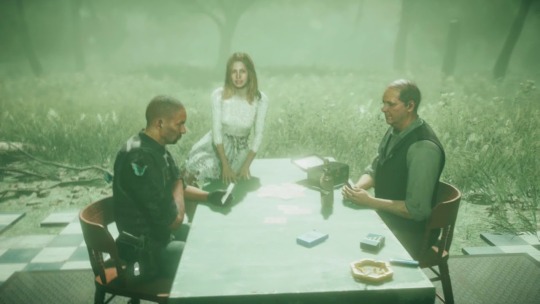
THE SIREN AND NARCISSUS
Faith bears the title ‘The Siren’, a creature from Greek mythology famous for leading people to watery graves by seducing them with their voices, and it therefore can be no coincidence that water is a recurring feature within Faith’s scenes. And, as The Siren, Faith uses desires and dreams to entice the disillusioned, before drowning them within the Bliss.
Nemesis is a siren in her own way, famous for leading someone to a watery grave- Narcissus, the man who fell in love with his own reflection.
Parallels can easily be drawn to Burke’s tragic tale. Once proud and confident, but discontented, he sits with the Deputy upon the water, quite literally reflecting upon his new life, filled with love for his new happier self. And though others try to save him, he cannot escape the obsession with these reflections and ultimately dies because of it.

PHYSICAL- APHRODITE?
In the Bliss, Faith seemingly possesses a pair of beautiful white wings. And while initially this may seem to suggest her angelic nature, it seems odd to brand her with the same title as the mindless Angels, when she evidently not only has free will, but also is of great value and deeply cherished by Joseph.
And so now we come to note that Nemesis is actually very often portrayed as a winged figure- the poet Mesomedes described her as “Nemesis, winged balancer of life, dark-faced goddess, daughter of Justice”.
Additionally, it can be argued that Faith also took inspiration from Aphrodite.
Nemesis was said to resemble Aphrodite, the goddess of love who is famously beautiful, and there are multiple lines of dialogue from characters within the game that reflect on Faith’s attractiveness. Hurk even asks if there would be any way of reviving her, because she is so beautiful.
It makes sense that Rachel, riddled with low self-esteem, would choose to empower herself by modelling her image on a goddess so desired. Parallels can be drawn to the Greek tale of the ‘Judgement of Paris’, where Paris, prince of Troy, named Aphrodite as the most beautiful, over Hera and Athena- just as Rachel was chosen by Joseph as the most faithful over Lana and Serena.
Finally, Faith is often seen with butterflies around her. In Greek mythology, the goddess Psyche was a beautiful woman who people began to covet and worship in place of Aphrodite, and she was eventually brought into the service of the goddess, having evoked her wrath.
Psyche is represented with butterfly wings.
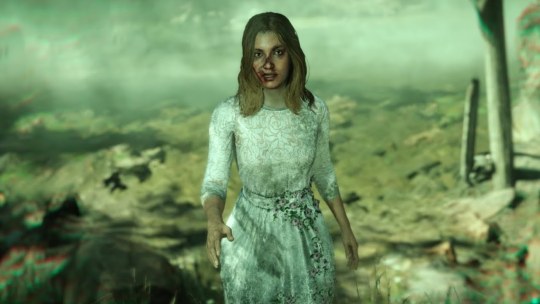
SUMMARY
Each of the Seeds act according to their own gospels, inflicted upon them by their own individual ‘Gods’. Joseph’s is the Voice. John’s are the Duncans. Jacob’s is his younger self.
And so who drives Faith?
She adores (and fears) Joseph. She learned from Jacob. But to assume that they are her Gods detracts from the severity of her actions and her evil. It removes her free will... and she is no Angel.
No, she must have set out to find a God of her own.
Tracey says of Faith: ‘This is what she does. Takes. Destroys.’ Faith knew misery in her life before the Project, and so is of the same mindset as the other Seeds- that happiness can only be found by enduring suffering and pain. And she may experience jealousy of others who have never had to suffer.
A quote I found on Nemesis read:
Nemesis believed that no one should ever have too much goodness in their lives, and she had always cursed those who were blessed with countless gifts.
In other words, Nemesis believed in punishing ‘undeserved good fortune’, not necessarily making people suffer completely, but suffer enough.
Just as she did.
Faith saw herself in this vengeful, loyal, beautiful goddess. She recognised her past and new mission within the holy figure’s doctrine. And with Joseph's open attitude as to how the Heralds chose to operate, she could easily merge her fantasies with his.
She became Nemesis, challenging the rightful goddess, and committing the very sin, the hubris, both of them sought to seek out and punish.
#far cry 5#far cry 5 meta#greek mythology#faith seed#joseph seed#john seed#jacob seed#marshall burke#virgil minkler#wikipedia is totally my friend hahahaha#i'm sorry if stuff is inaccurate#greek mythology is so complicated hahahaha#this started as just an analysis of nemesis#but the others fit so well#I just couldn't ignore them#I've been a coward about posting this for days now#I just get so nervous hahahahaha#hope you enjoy!
90 notes
·
View notes
Text
For all I’ve done to finally feel comfortable as myself, for all the blind hubris and shock and awe I’ve instilled upon the straight bros, to now even the point where my very feminine ass can walk into the function and humble some of those bastards, I still get hurt even in the smallest amount by the sheer hatred of straight people. Whether it’s the open homophobia from straight men or that condescending pretend “friendly” women do I still will never be considered an equal. I cannot say it doesn’t bother me, in a way it feels that it doesn’t and has not really for a long time, but the realization and slap to the face that I will never be considered an equal. No matter how much I build myself up, no matter how much people change, I’ll always be inferior to them. There will always be people who on first sight decide that I am something that is not worthy, that I am some degenerate freak of nature that is an element that is only tolerable at best and that makes me sad it really does. I’ll never be a full person in their mind, that’ll always be something people will tag onto me; no matter how innocuous it is we will always be a kind of inferior, some perverse aberration that either’s tolerated or celebrated in a I guess “straight man’s burden” type of way. I’ll never be anyone’s equal, I’ll never be able to grow into myself because gay people cannot ever truly be themselves without conforming. Even pride is just confirming to an archetype, everyone who gets the shit end of the stick is still fucked by that, even the act of feeling comfortable is something to be mocked ever so slight.
I can’t really cry, but I really did shed a tear. Not sure why, this is a realization I already know. Just really really sucks to be reminded that people will always hate you just because you’re you, no matter how comfortable you are. It’s just something you know always, that look you remember it as if a reflex. That slight shock in the eyes, then the avoidance of direct contact like you’re a blight, some inconvenience that they must either pretend to tolerate or be bold enough to get rid of. I wish that they would just call me a faggot to my face, I wish so badly so badly in that moment I had told them how I felt. I know it would change absolutely nothing but I hate how small it made me feel, that I accommodated that man that I bent over and tried? To please them?!
0 notes
Text
I Don’t Trust Atheists on TV
__________________________________________________
Winfred Thoroughfare
Assoc. Reasonable Man Contributor
There’s something unsavoury about television personalities in general, but especially those that address the topic of religion. As a reasonable man, I don’t trust religious personalities on television at all, but I couldn’t say that I distrust overt atheists any less or believe in them any more than the commercial evangelists.
The Call To Atheism
For an out-and-out atheist to take to the stage and the limelight, they must have some sort of mission. Namely, to sell their book, but on the back of that goal they have a supplementary objective: the destruction of religion. TV atheists usually don’t espouse the benefits of one religion over another and typically hate them all. Their goal is to destroy world religion. But as most of them in the English-speaking circuit come from the United States or England, they usually set their targets for Christianity, making little distinction between Catholicism and Protestantism, but viewing Protestantism as slightly more evolved because it can in certain cases be more secular, and usually making no distinction between Orthodoxy and liberalism, since such a divide is unimportant to the U.S. / U.K. audience.
While they are no worse than idiots spreading religious lies and falsehoods to a closed loop of believers on TV, televisions atheists are often consumed by their particular egos and in propagating the achievement of their respective book. Even atheists who feign humility will go on and on about how humble they are, and take the stage to speak of how they do not care for recognition. The companionship of atheism and egoism is likely, probably because the atheist feels as if there is a thousand-year-old tradition spanning human existence up into the majority of the present population, yet they alone in their limited group of intellectuals have solved the ultimate problem: that the big, existential lie of monotheism does not exist.
Everyone knows it’s not so simple. It is an easy matter to prove that any religious text is demonstrably false, and every religious tradition is inconsistent and inane more often than not. But that does not negate the purpose religious has in society, which is not a historical or scientific one, but a bluntly cultural function that often guides socioeconomic behaviours.
Christianity in the United States, for instance, is a markedly isolationist, greedy, and self-indulgent religion; it exists to justify the biases of the congregant, not to challenge a sense of conformity or growth. While American Christians might take umbrage with that observation, pointing to charitable works by their millions of churches and blanket ideals of amicability, religion in America is more often an economic identity or a regional heritage than a calling to a universal standard, and the threat of hell to the nonbeliever out-levers the embrace of opposing factions to a ubiquitous degree.
The Mormons, who may call themselves the most American sect of Christianity (as they claim Jesus was an American) prioritise charity, discipline, and humility for the congregant — all which could be viewed as selfless virtues. But, of course, the Mormons are also extremely strict about social habits such as embracing all forms of abstinence, and their charity comes as a cloak over the dagger of proselytisation and attempts at conversion. Humility on the individual level may be cooperative, but at the institutional level it plays a part in enforcing conformity and obedience from the top down. Charity comes with expectation, discipline comes with sacrifice, and humility comes with ceding control. While it may be hard for a believer of such transactional and oppressive religion to hear, there are forms of Christianity that ask the believer to give up nothing, and instead revel in what there is to gain in following ‘the one true way.’
While religions are often polluted and poisoned by administrative strangling of the freedoms of their lower communities, all religions at their centre have a commentary about the nature and purpose of life, a narrative on the conquest of death, and a guide to live a happier and better existence. Most people are not blind to the corruption of the global clergy, but are happy to ignore and accept the nonsense in return for the community and spiritual gains, or at the very least, the illusion of these comforts. The evangelist atheists underestimate this along with the capacity of their audience whom they ostensibly hope to convert, and underestimate the mortal terror most people have of death and living a useless life.
To broach this fact, many TV atheists speak to the fact that they don’t care what a person believes or how they find comfort, so long as it falls within the cliche utilitarian principle that it does not harm another person. For these atheists however, that is a hard definition to make, because they are very much building a public profile and a career on exterminating religion because they view religion as necessarily irrational and damaging.
Take the prominent TV atheists, while all of them are somewhat fading as of late: Christopher Hitchens, Sam Harris, Stephen Fry, Daniel Dennett, Neil deGrasse Tyson, Bill Maher, Richard Dawkins, and Bill Nye — it is difficult to trust any of them on the topic of religion. Not because they can easily and conveniently poke holes in religious structures, as we all can, a child can grasp the paradoxes and mistruths of a religious story or text, but because they do not offer an alternative set of mind.
Becrying a problem and then failing to point to a solution helps no one. How will religion die? Where is the answer to that question? They avoid this question. Yet, to the TV atheist, questions of god are easy: Is God all-good? Of course not, because the world is a place that is not all-good. Is God anthropomorphic? Of course not, expecting the creator of the universe to resemble humankind is a clear limit of human hubris and egocentrism. Is God real? Of course not, there is no evidence that a god exists, and all religious accounts we have are clearly incorrect, so there is more reason not to believe and remain atheist or at the very least agnostic than there is reason to believe, therefore any god does not exist. Everyone but the deepest and most repressed religious fanatic has asked themself these questions and come to these rather obvious conclusions, and they didn’t need to map it out in a lengthy book to do so. Yet, still, to the vast majority of people it simply does not matter.
If you meet a Christian on the street and become upset that this man could believe in such a stupid, corrupt, and repressive religion as the Christian church, what will you do? Tell him that the church is corrupt? He will respond that the message of Christianity is dependent on Jesus, who is perfect, not the church, which may well be corrupt.
What if you tell him that Jesus did not exist? Or that Jesus was just a man, and not a deity or demigod as the Christians claim? He will respond that it is irrelevant, because the Bible is a narrative handed down through the generations and not a book of current events, and he values the heritage of traditions set forth in the Christian faith, regardless of the perception nonbelievers have of the Bible, and regardless of whether the account of Jesus exactly correct or not the message of Jesus is real, and that is all that matters.
What if you tell him the message of Jesus and the Bible is inconsistent and self-contradictory? He will respond that it is the duty of a good Christian to see the true, all-good message of the Bible by picking out the good parts as scripture, and ignoring the bad parts as a list of examples of traps of sin not to fall for.
Any argument you throw at this man about the history, epistemology, or philosophy of the Christian faith are irrelevant, because all he cares about is the end result: a belief that Christian teachings will guide a good life, and holding an absolution from the fear of death. Atheists can spout off their nonsense as much as they want, but unless they have a good alternative on how to live a meaningful life and how to not fear death, nothing they say actually focuses on the points at hand. And it is these two questions atheists routinely fail to address.
The TV atheist would tell you to live a life that feels good and helps others, and to accept the inevitability and futility of death. Not only are such statements callous and almost entirely incompatible with human psychology, they are easily criticised through quite valid complaints against hedonism and fatalism. Just as easily as religion in practice falls prey to the atheist attack, atheists’ advice in practice also can quickly fall flat. If religion is a lie, it is a lie that helps the individual live their life.
Atheists are brought back to their initial debate: If god (a higher, infinite purpose) doesn’t exist and if believing something doesn’t hurt anyone else, there is no use in changing the world as it is. But religion is an exception, because while it may help the individual, it hurts society, therefore there must always be a separation between church and state. Yet atheists are forced to reconsider the fact that religion is actually bad for society, and if it indeed isn’t at least worse than the alternative, then to consider the problem that promoting atheism actually trips the lines of not hurting others.
If atheists are spreading anti-religious rhetoric because they know religion to be false and consider it useless or redundant, but in so doing break the spirits of religious people, they are causing harm to others with out of a personal grudge or for the purpose of a vanity project. And if it turns out that human beings start to feel hollow and morbid in the broad absence of religion, or a replacement of religion, and the atheists are not able to provide that replacement, then they will have dismantled a potentially essential part of society, not only in transgression of their values of utilitarian freedom of ignorance and freedom of belief, but also to the detriment of many disillusioned peoples’ lives.
TV atheists would tell you that religion actually does not offer people anything, and everyone would be better off without believing in myths and lies, but people believe in existential lies all the time. The whole of human existence is based upon illusion, not least of which the illusions of the senses and the illusions of consciousness. Religion may be false, religion may be stupid, but by the very rules atheists set for themselves about what is acceptable for other people to believe, religion does not cause enough harm to justify an atheist making a highly public profile and international campaign in favour of destroying religion.
Atheism is not the same as education, as, again, many religious people are fully aware of the gaps in their religion already, but they choose to ignore them. That is an informed decision to remain ignorant of a problem, which is very different to being ignorant of that problem in the first place. Atheists setting out to teach Christians the truth about Christianity because they want to look so informed has a reverse effect of making the atheist look foolish and narrow-minded. Once atheists are making arguments about the weakness of religious thought, it is no longer an educational session but is just that, an argument, and if TV atheists are utilitarian as they claim then they should recognise there is no utility in arguing a moot point. Even is a religious person lapses from a religion based on being persuaded by arguments, they might change their nominal identity and retract support for a religious movement, but are their core values and daily routines really all that likely to change. They are the same person, but they just no longer check the “Catholic” box on registration forms, and now they will attend annual atheist book signings instead of attending weekly mass (which one could argue is a downgrade in practical social terms).
Many of the complaints atheists have are also complaints religious people have: Corruption in churches, mosques, temples, and synagogues; Vapidity of religion in politics; Deviation of contemporary religious teachings from the revelation of ancient religious texts; The failure to modernise the message of some religious doctrines on a regular basis. These are not religious failures, but social failures, and as the religious person would be quick to point out, religion is the solution to social ills, not the cause.
An atheist arguing with a believer about society, where religion is the solution to one person and religion is the problem to the other person, won’t get anywhere. It would be much more useful to actually argue solutions. Bill Nye arguing religion in the objective that undermining Christianity would somehow bolster Darwinism was misplaced; he should have stuck to solely explaining evolution rather than argue with someone who refused to listen to what he was saying based on irrelevant defiance of facts. That is not a religious problem — as many, if not most, Christians embrace evolution (not to mention, many nonbelievers refute evolution on baseless grounds) — it is a problem of dealing with an idiot. Tracing the gospel of Jesus will never advance that conversation, because that was not the question at issue, and Nye should have seen through and restrained himself from the red herring. Just because an idiot wants to invoke a “religious exception” to facts does not mean it is worthwhile to focus on the appeal to religion, as the tantrum against facts is the real point of contention.
TV atheists going off about religion in public sounds more like TV religionists than not. They both have a message to sell for their own sake, usually a financial or even spiteful incentive to push those ideas, and are driven above all by an egoism of hearing themselves speak a correction to the flawed masses while reaffirming just how right they are and how their own rules do not apply to themselves. In short, they want attention.
An instance I completely lost all possibility of respect for Richard Dawkins is when he gave a televised speech and took questions from an audience. All the audience were likeminded to him, as you might imagine the kind of draw to a commercial book promotion for a text Dawkins had authored and was willing to sell and sign for a price. There was no ‘reaching the masses,’ only an atheist author playing an atheist crowd, or — as they say — preaching to the choir. One spectator asked Dawkins a moral question, a chance for Dawkins to build a moral philosophy to replace the absence of modern religious guides to life, and that question was, shockingly, if gay incest was morally acceptable and even healthy. Disturbingly, Dawkins agreed with his pervert fan and said that it was okay, specifically for a lesbian mother to have sex with a lesbian daughter, or for lesbian sisters to have a long-term or exclusive sexual relationship.
A perfect example of how TV atheists will say anything to sound contrarian and build up a stir while playing their fanbase, and of how completely devoid of the human condition their thinking is. Having sex with a family member, or against an imbalance of power, is not solely wrong because it could lead to genetic diseases or questions of parenthood as Dawkins assumed. Those are costs to be reckoned after the fact. But it is wrong in the conception of the act because it violates the family structure and destroys the development of a normal and healthy life if a parent views their own child as a sex toy to be groomed into adulthood, and it violates the requirements of happiness and satisfaction in consent if there is a power imbalance in a purposefully mutual relationship.
While the loser in Dawkins’s audience obviously didn’t realise it, there is a need in human relationships to have a bond on a personal level, to have an unconditional bond on a parental level, and to have a familial bond on the sibling level (including cousins). People’s relationships are not just sexual.
Promoting incest in the presence of contraception or homosexuality as Dawkins did in an offhanded comment is disgusting and disturbed, because such a broken system would be harmful to the people involved on a social, biological, and individual level, depriving them of the value of having a family. Viewing each person as a sexual object, and each household as a harem in the process of self-breeding where people have no worth outside of being violated by their close kin, not only undermines the first and most major drive that people have in forming new relationships despite the risk with new people but it also corrodes the safety and security of life at home. There is a reason that most people don’t have an urge to have sex with their family members, and where it does happen occasionally it has never in the history of any human society on Earth been viewed as most normal and best long-term option.
Just because people consent to something does not mean it is good for them, and two lesbian siblings having sex with each other could only lead to disaster (or is likely the product of some previous disaster), no matter whether Dawkins and his acolyte have given them the go-ahead. As pornographic as it might feel to have sex with a sibling to the Dawkins-brand of utilitarian, such a perversion of biology could never compare to the fulfilment of going out into the world and meeting someone who cares for you on a purely sexual level without destroying the deeper relationship you have with a sibling for the rest of your life after the hormones wear off.
Most people know that hooking up with an ex or a co-worker is a bad idea, yet Dawkins is telling people to go for their mom if she’s into it and they bring a condom. And as a biologist, hiding behind the title of biology to push evolution as a trojan horse for atheism, Dawkins should — should — have immediately noted that such a stance is evolutionarily unsustainable if adopted to any real degree, and that it comes off as somewhat homophobic and ill-informed to acquaint doing gay stuff with doing incest and then say it’s cool only because “they can never have children.” Gay people are not black holes of morality, nor are they dead ends of evolution, which Dawkins neither said nor implied, yet that was implied by what he said.
Perhaps tellingly, Dawkins and fan completely failed to understand the fact that sex is a behavioural more than a procreative act — another misconception about human nature Dawkins ironically shares with the church. As a general rule, as well as an absolute rule, say no to incest.
While that’s Dawkins, and maybe people never respected him anyway, the other TV atheists have a repetitive air to their talks of wasting their time (Bill Nye), pushing an ulterior agenda (Sam Harris), going on a pointless rant (Stephen Fry), flattering their own ego (Richard Dawkins), suffocating people with the obvious (Daniel Dennett), being generally unsufferable if not all of the above (Christopher Hitchens), failing to properly contextualise the issue (Neil deGrasse Tyson), or acting out as a contrarian (Bill Maher). If being reasonable is the only goal of the TV atheist, they ought to reason out the fact that religion does play a role in people’s lives, and solving the issues of child rape or poor education or genocidal conflicts are not as simple as saying, “abolish the church,” because the church is a manifest if flawed representation of religion, and religion itself is not responsible for those atrocities.
If anything, religion is a meaningless term — especially in hyper secular and materialist societies like the United States, Britain, European Union, China, and Russia — and especially in hyper dogmatic societies such as Pakistan, Iran, Tanzania, Israel, and Argentina. Religion means whatever the religious person wants it to, and that is not due to ignorance as the TV atheists believe, but is actually by design.
People convert religions, lapse, mutate, and protest their teachings in accordance with their own beliefs. Just because this happens behind the scenes and in silence for most people does not mean the internal doubts and realignments do not take place. And at the end of the day, religion is still there, because people need a sense of purpose and a reason to live their lives, and because most people (unlike the impenetrable exterior of the common TV atheist) don’t want to die — and the concept of death includes aging, being outperformed by rivals, feeling useless, losing a sense of purpose or time, feeling regret over memories, and facing the unknown in both the present and the future.
Religion helps people by telling them lies. Such as in America, American-Christianity telling people everything happens for a reason, telling people that god has an individual purpose for them, telling people that money does not corrupt but instead empowers, telling people that they are guaranteed to live forever in a perfect existence after the first inevitable death which they already know is coming, telling people that they can never be alone because god is always with them, telling people if they do the right thing the right thing will happen for everyone in the end. No one in their right mind could live in a world where they did not believe each of these things were true, regardless if religion is what gets it to them.
Having a handful of rich, famous, and disillusioned men complain about the idiot commoner rejects reality, or complain that the idiot commoner is being scammed by the insidious clergyman, because they just won’t accept that their lives are meaningless, and that there is no plan, and that there is no afterlife, is — frankly — mean-spirited, impractical, dishonest, harsh, and somewhat insane. Atheists may have qualms with the rabbinic tradition, but what is the harm whatsoever in a Jewish person believing that they have a calling in life and suspending disbelief is something challenges that identity? That does not mean that religion cannot or should not be reformed constantly, but the TV atheists need to start asking what is their calling, and what truly does it mean to be religious.
0 notes